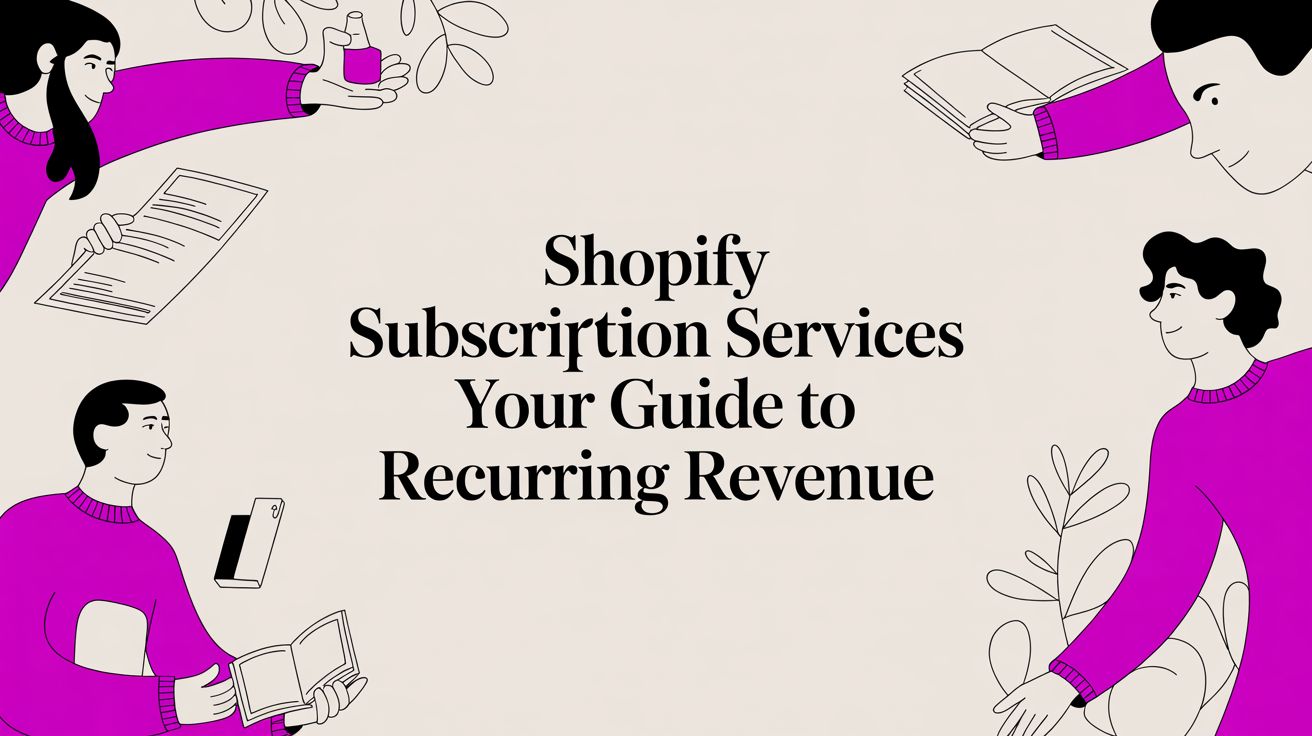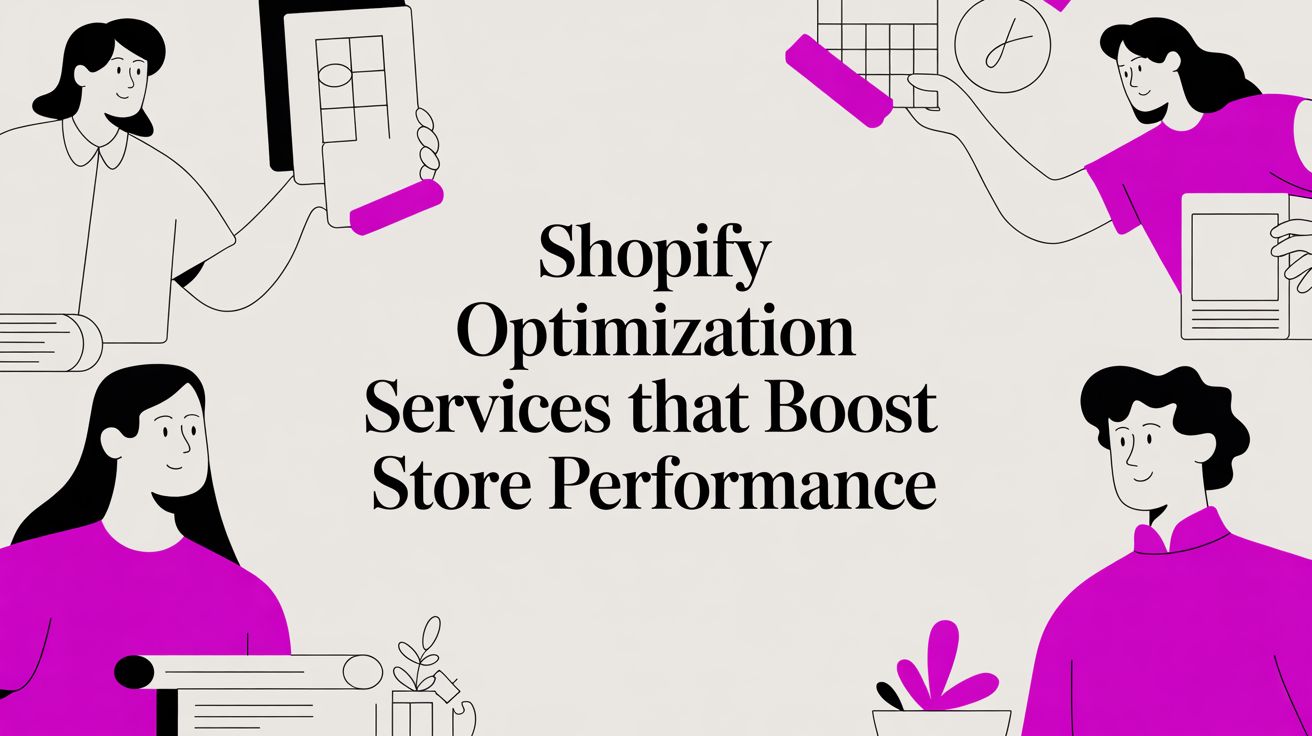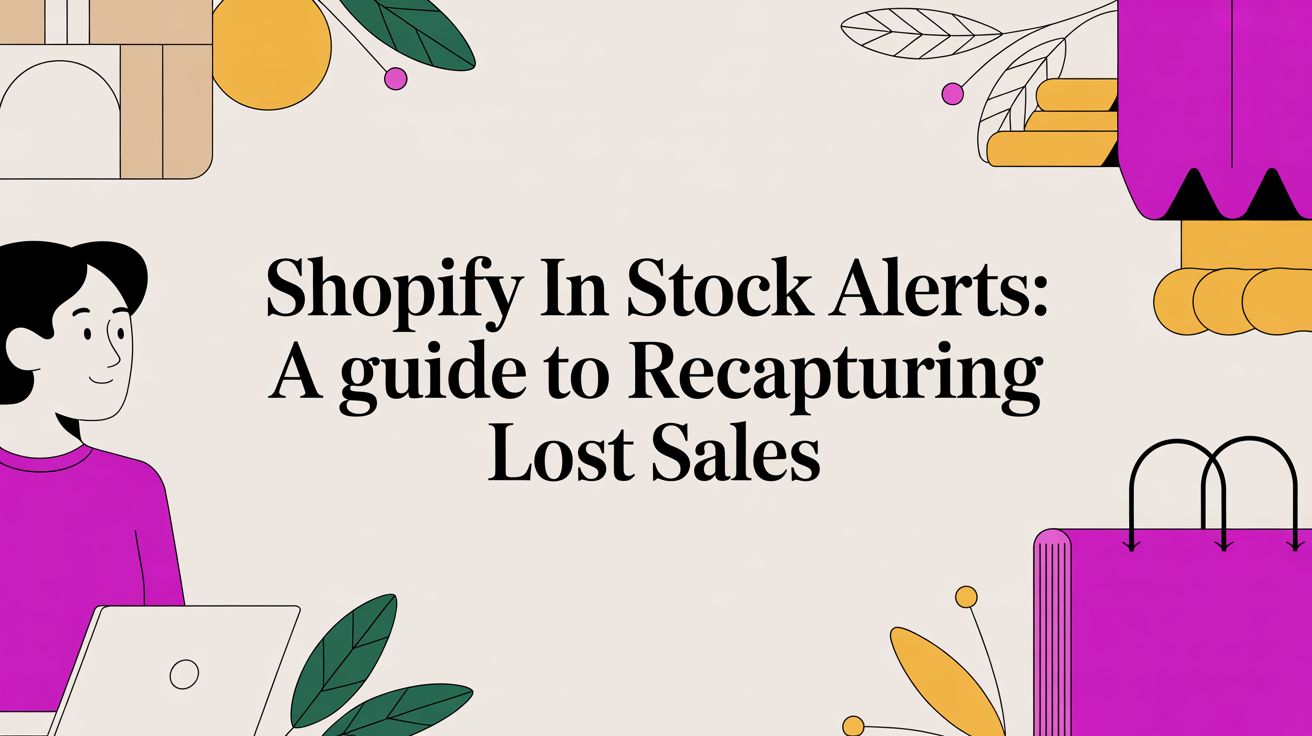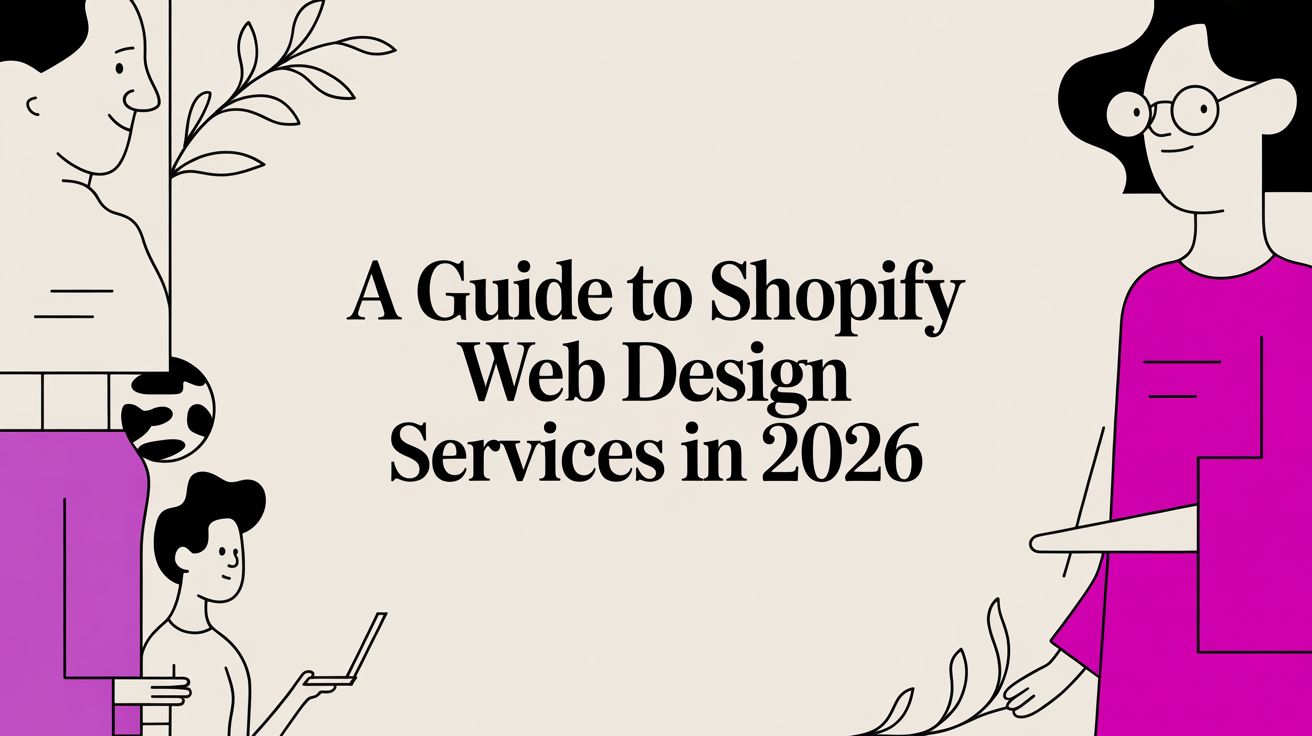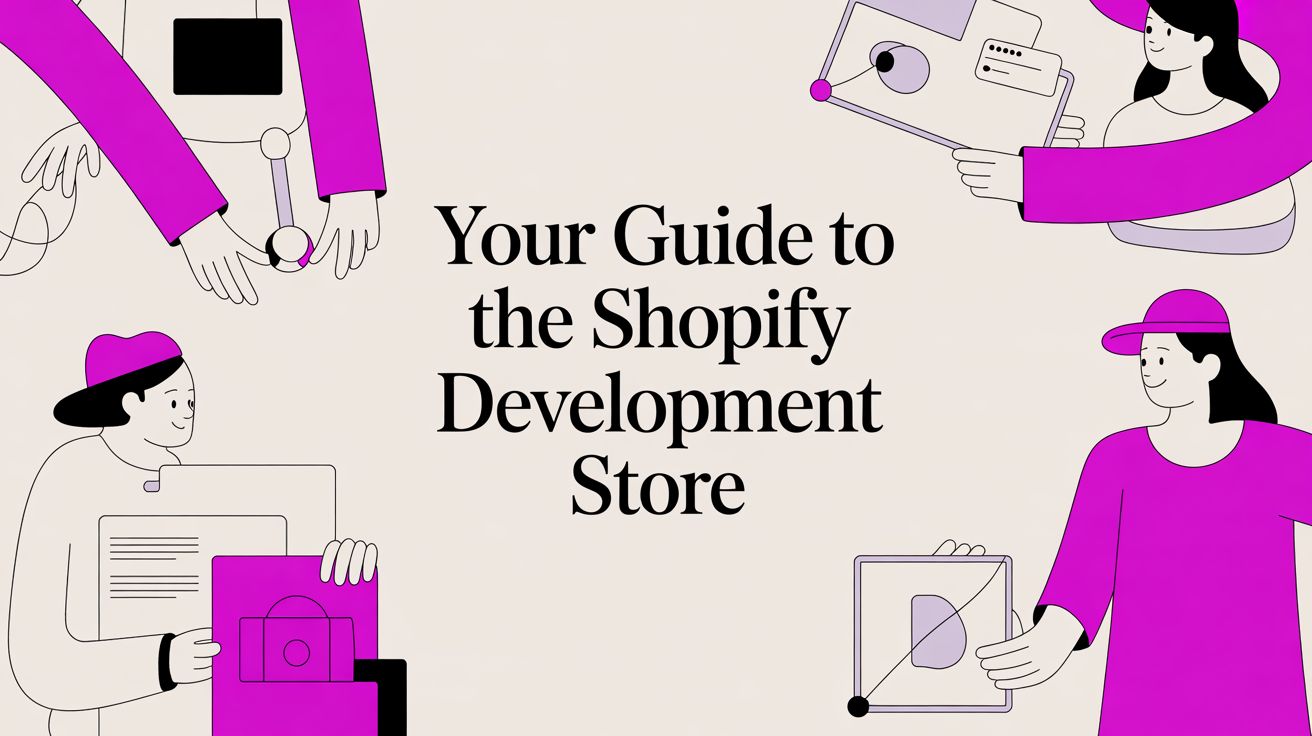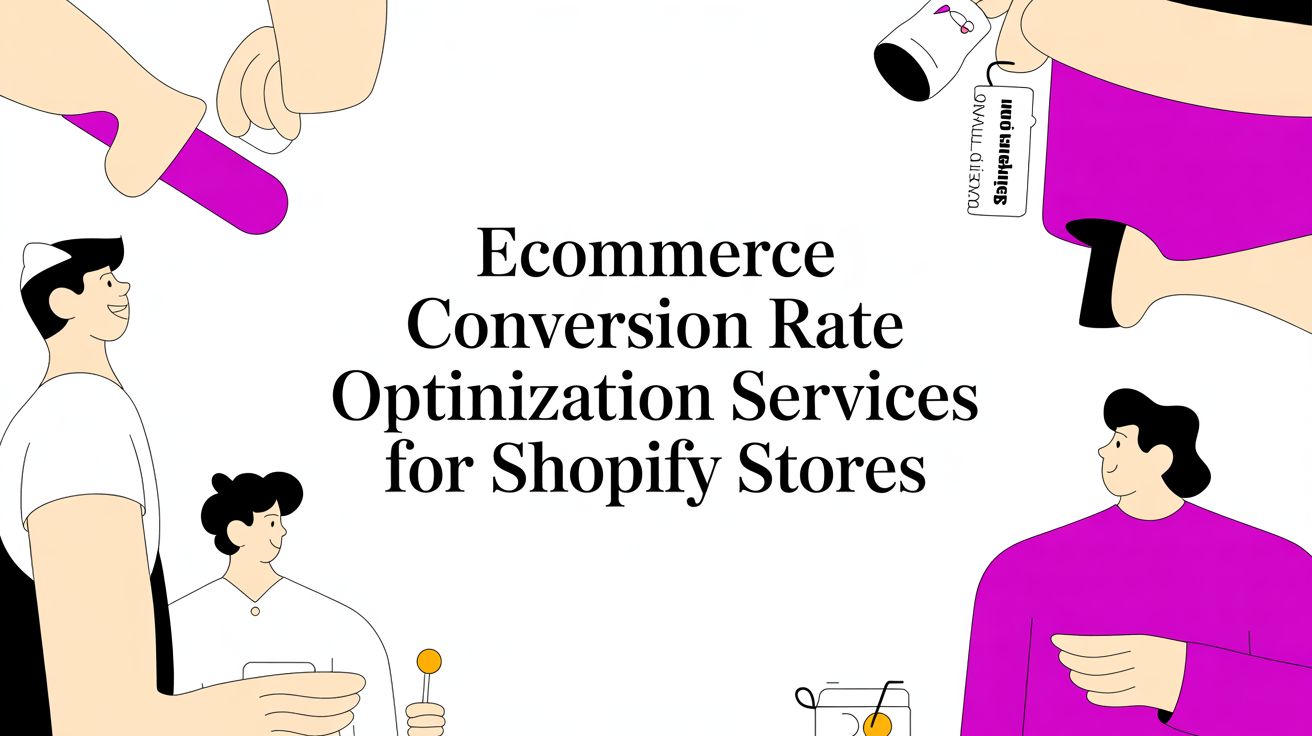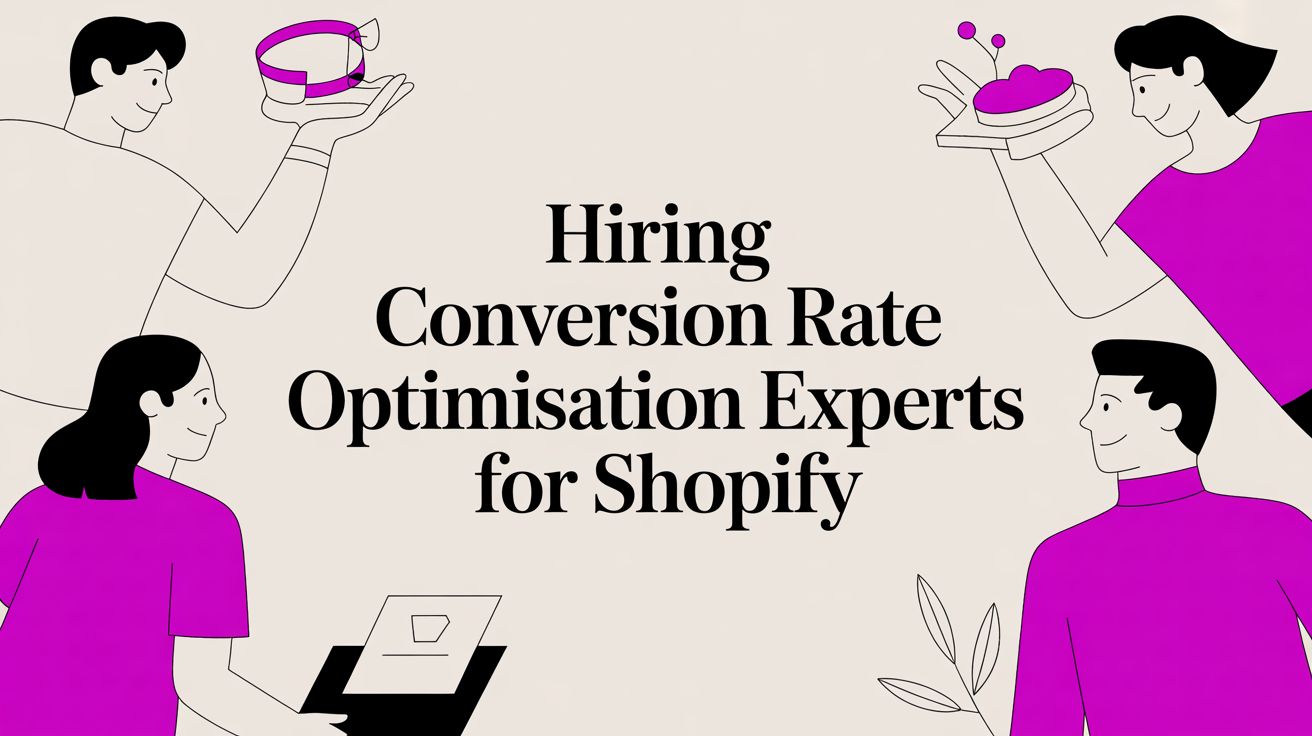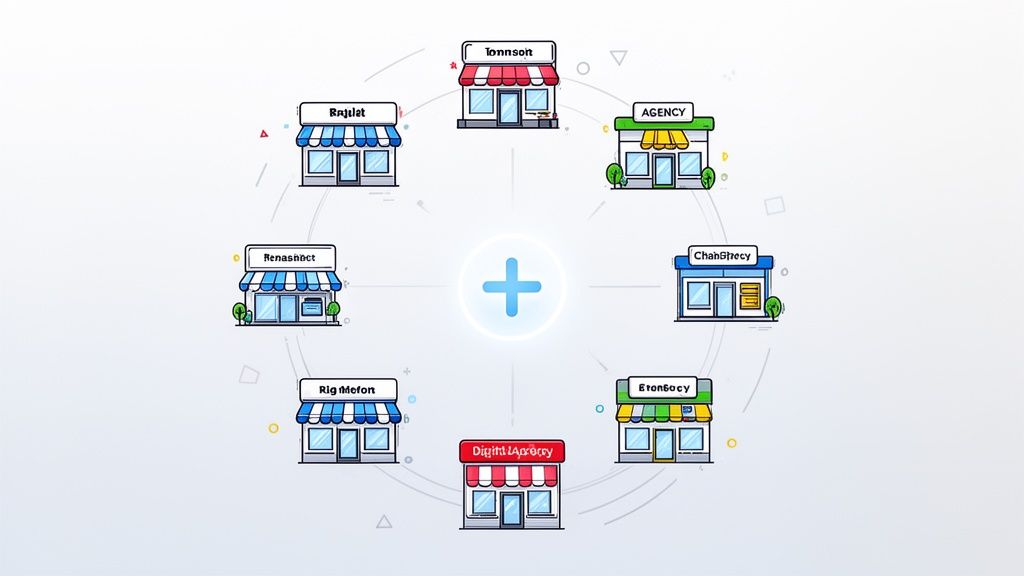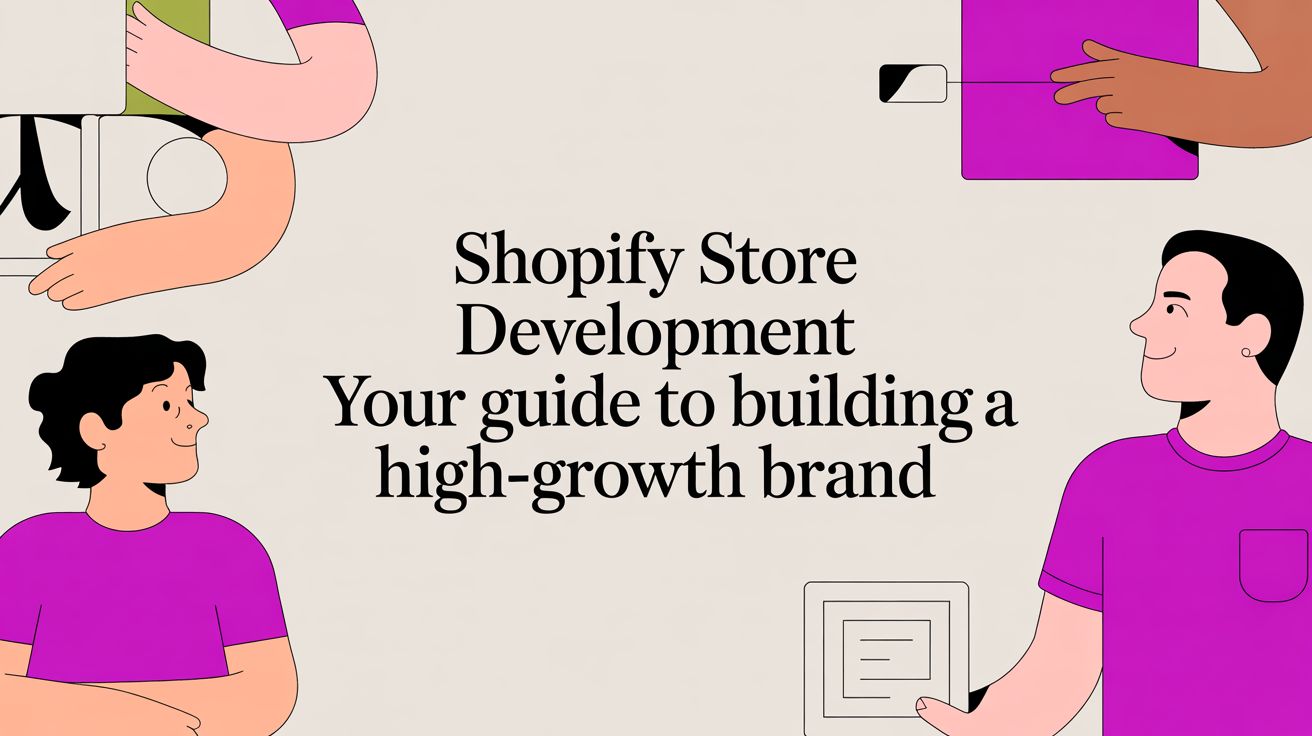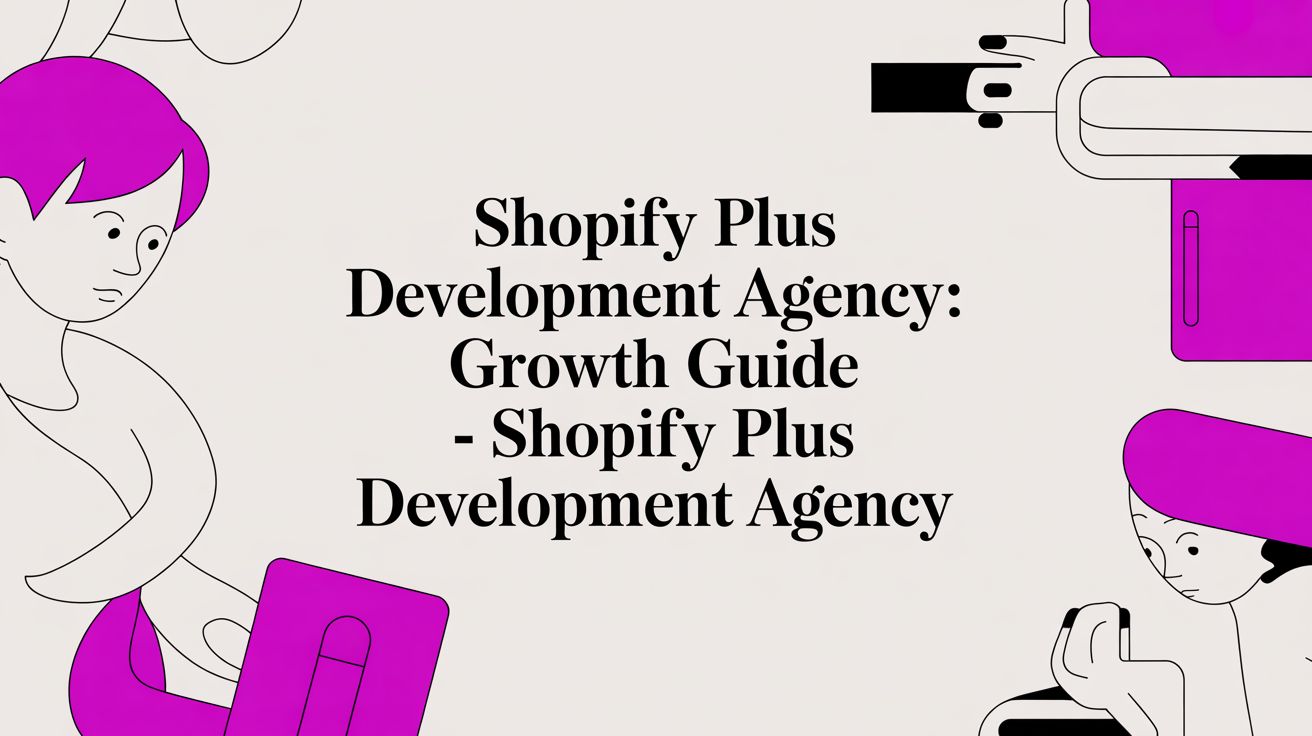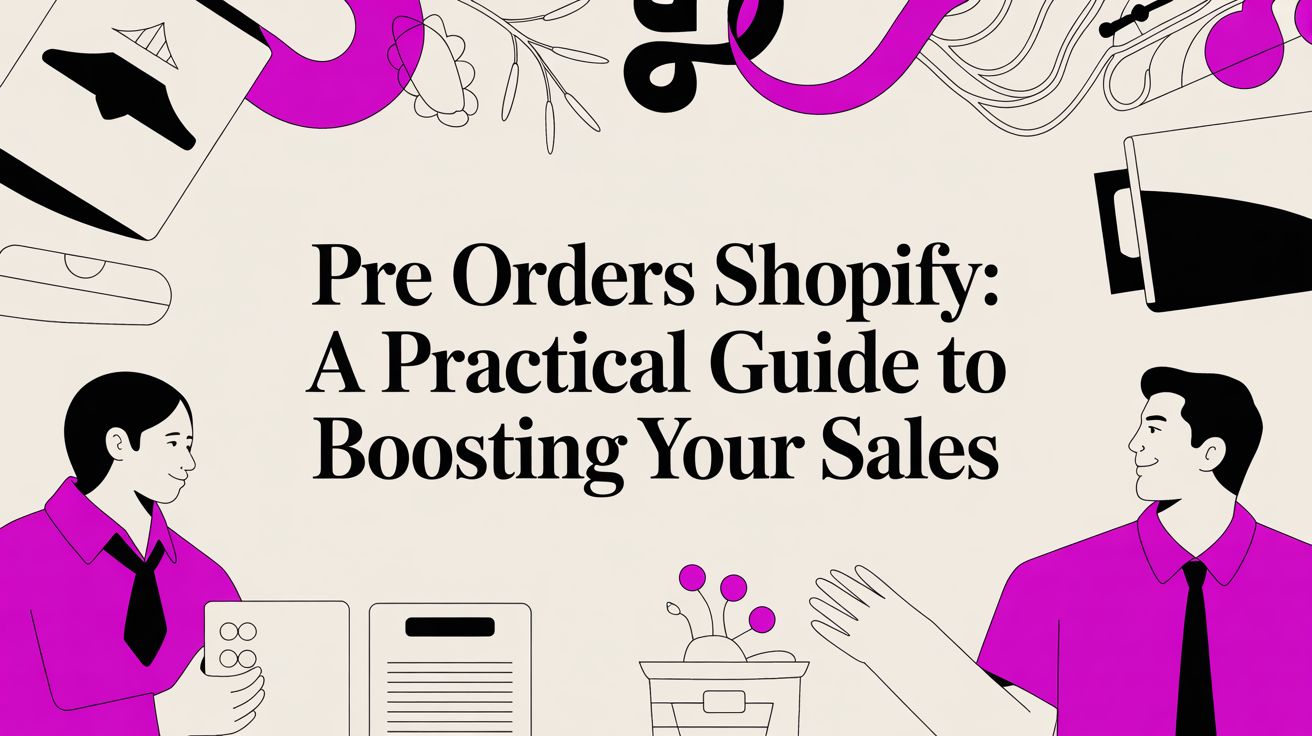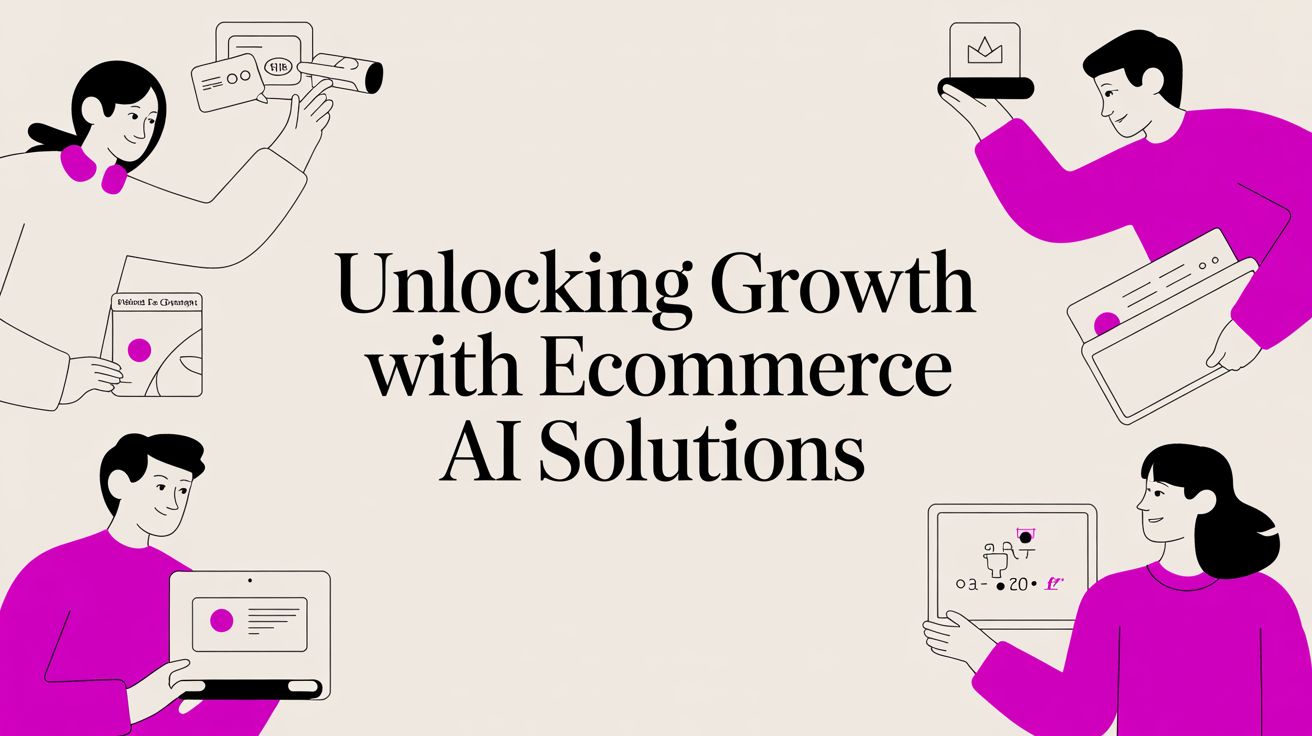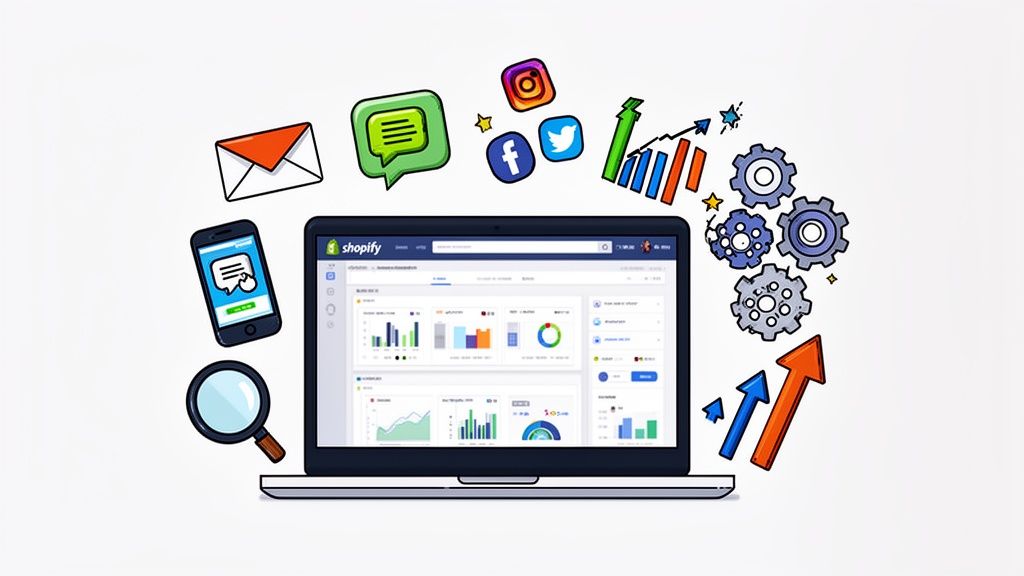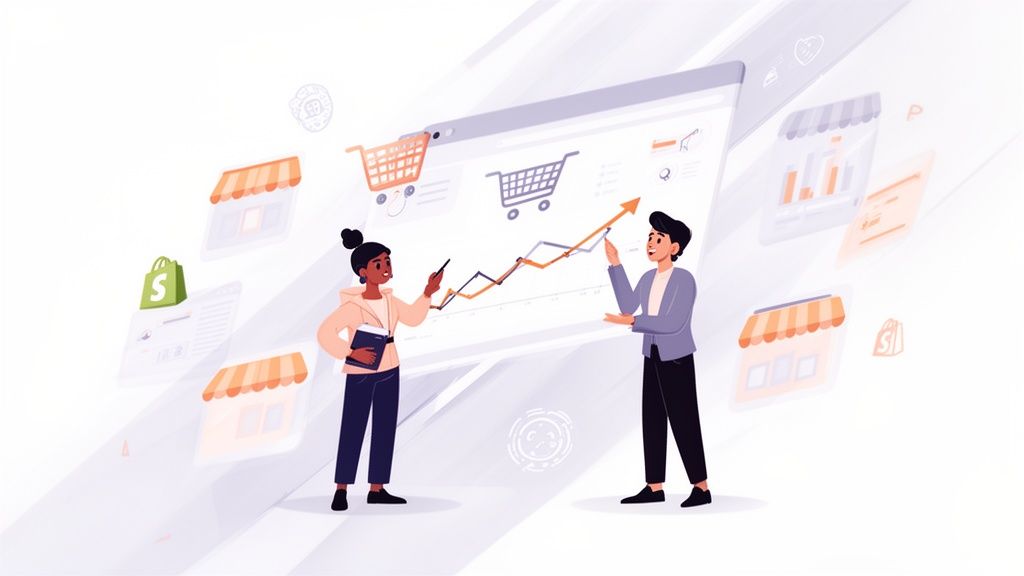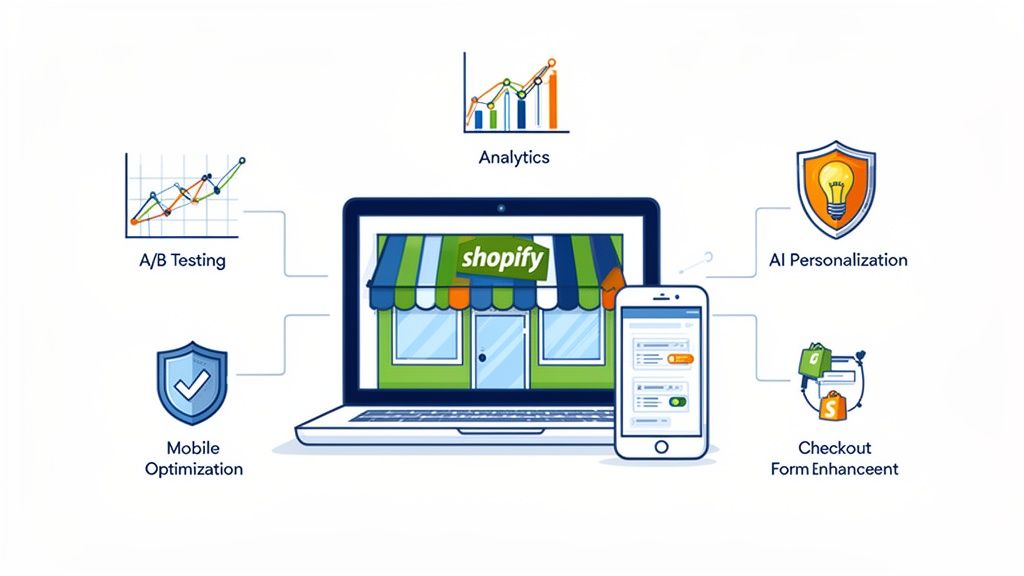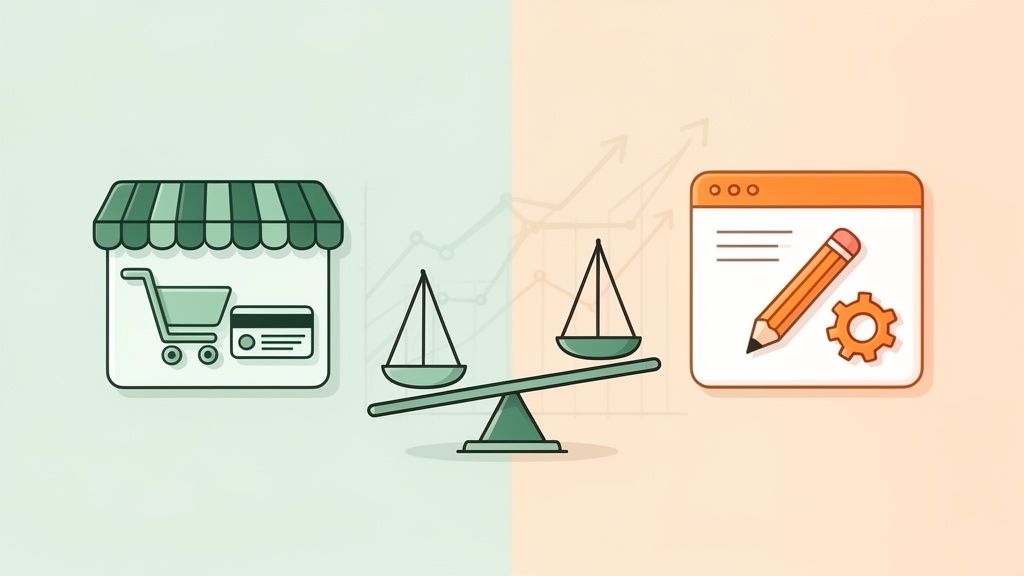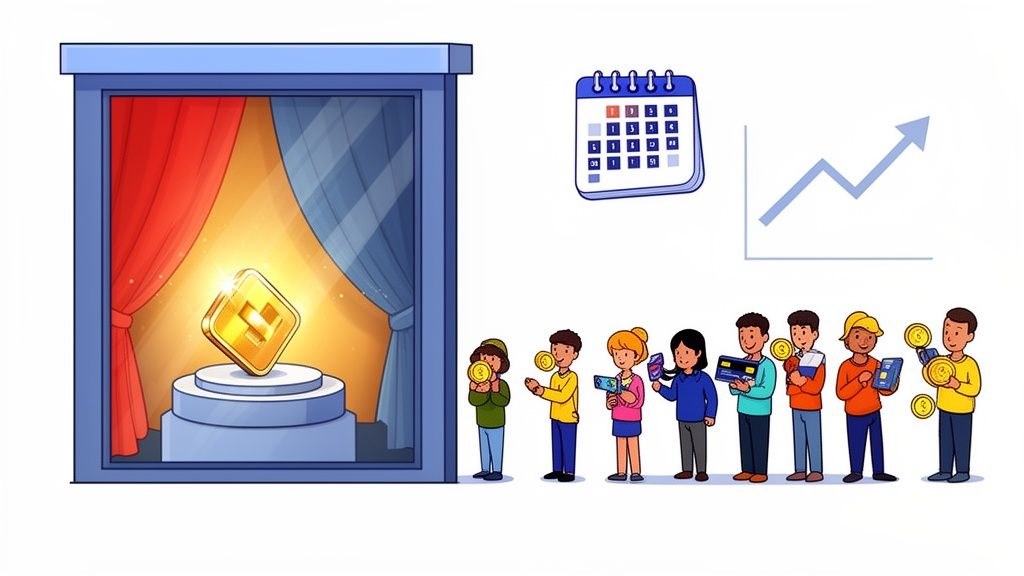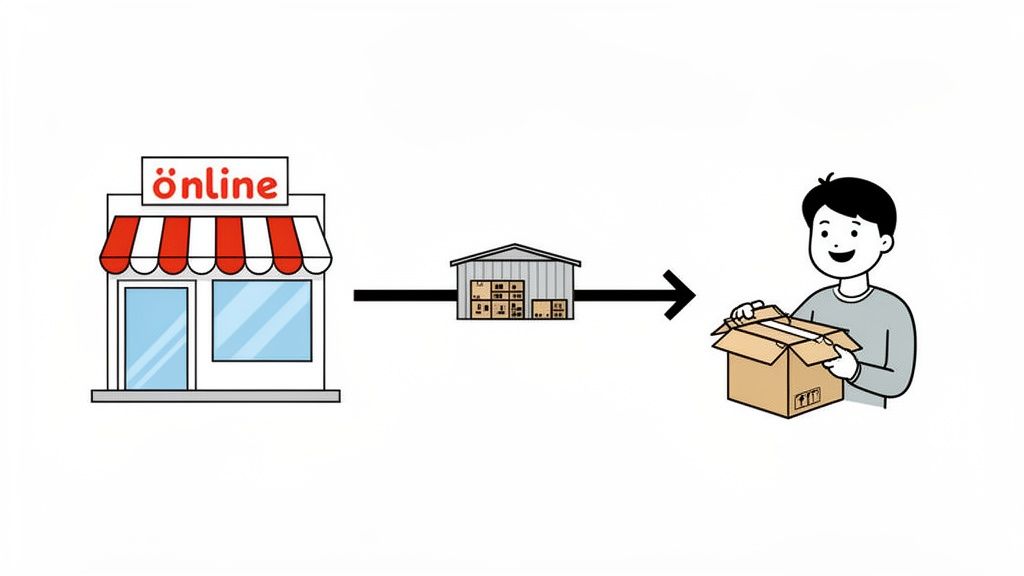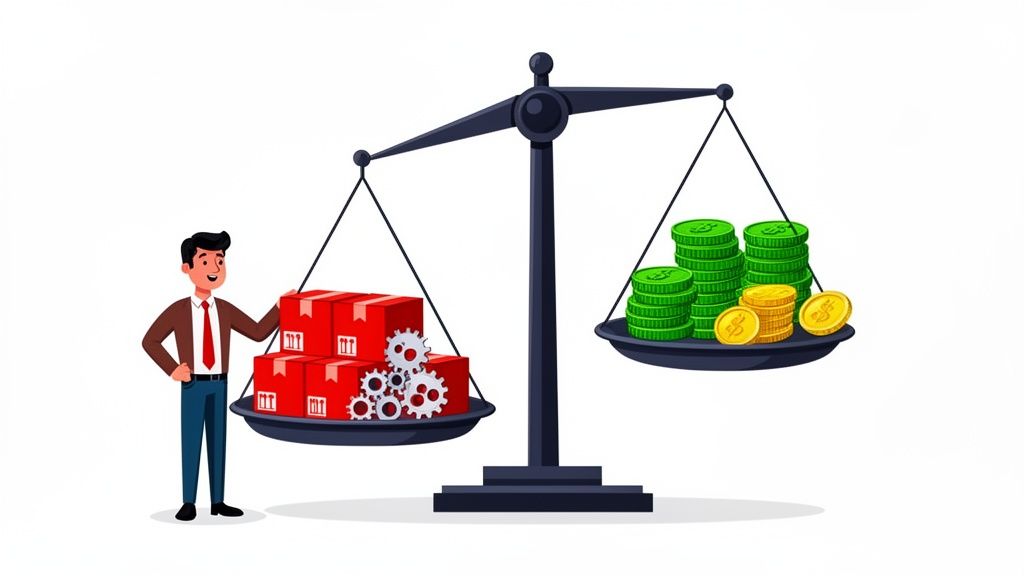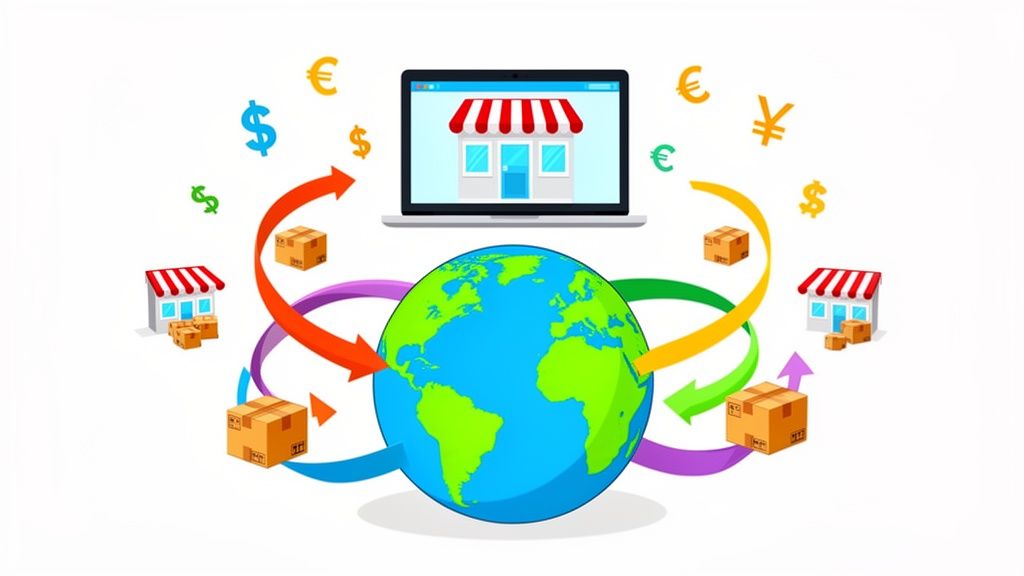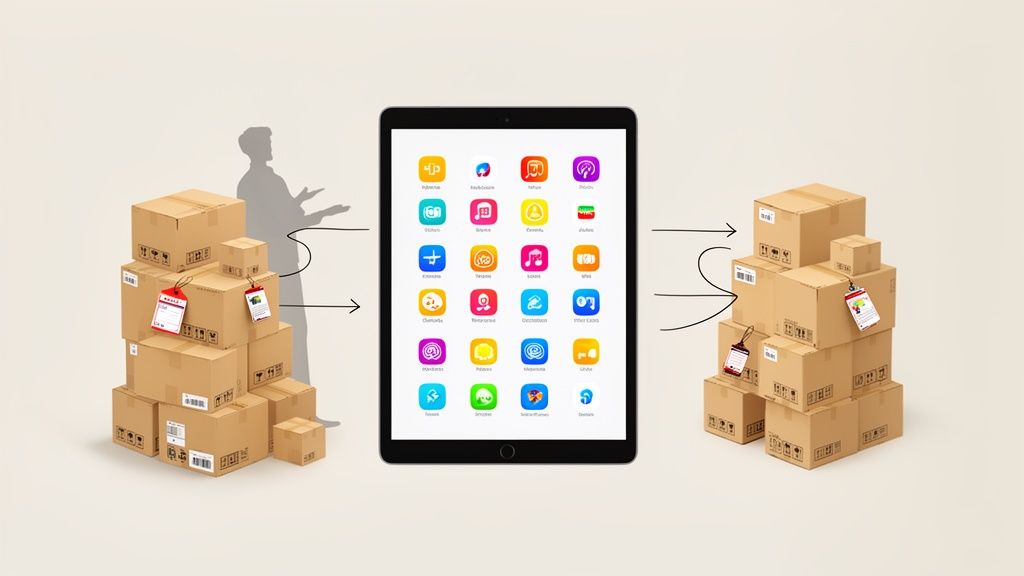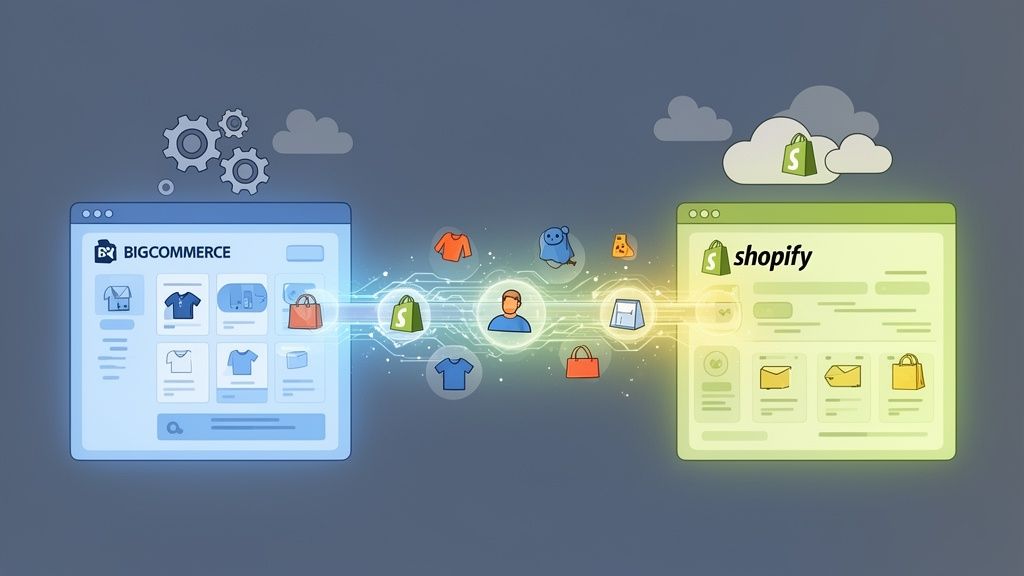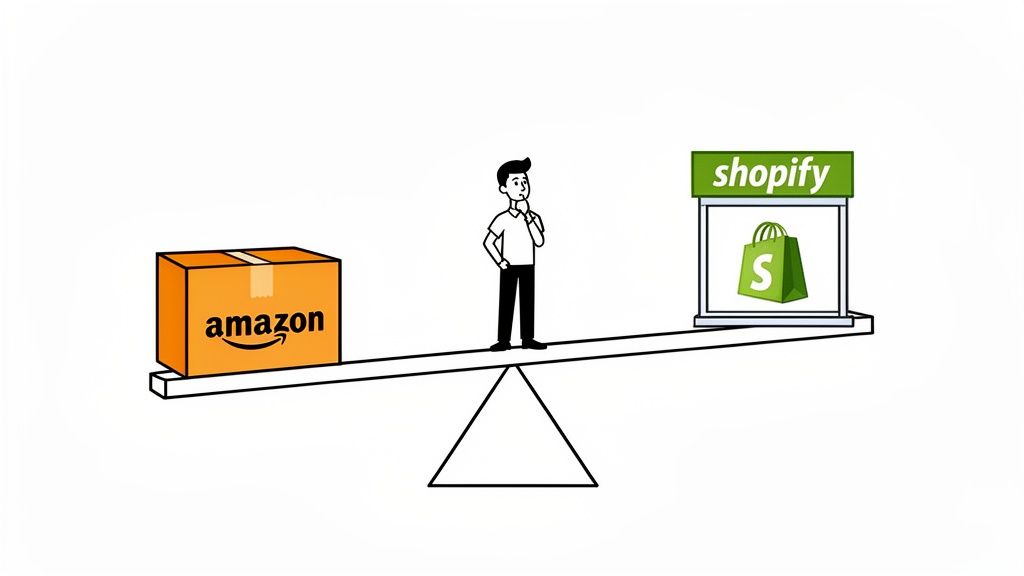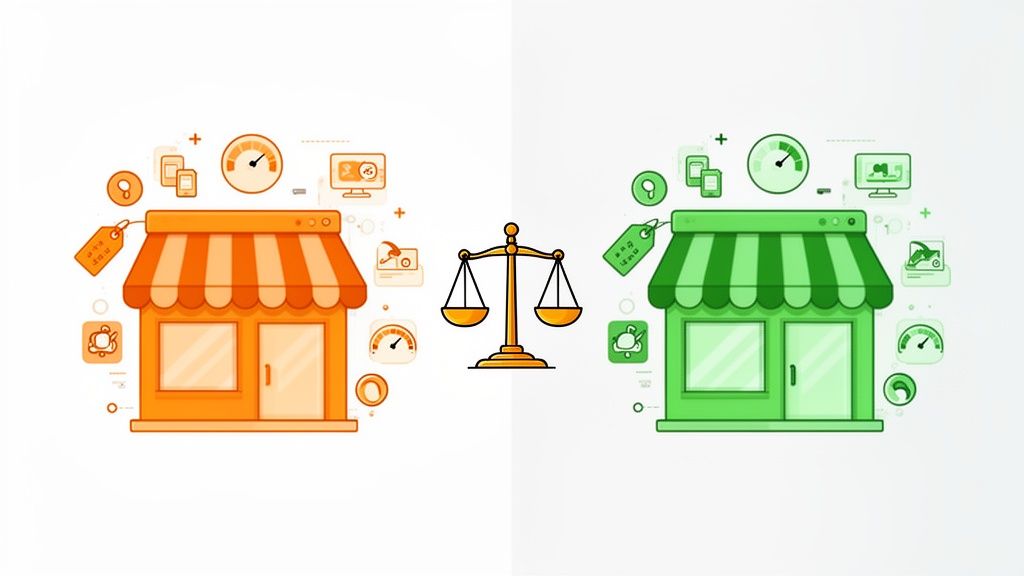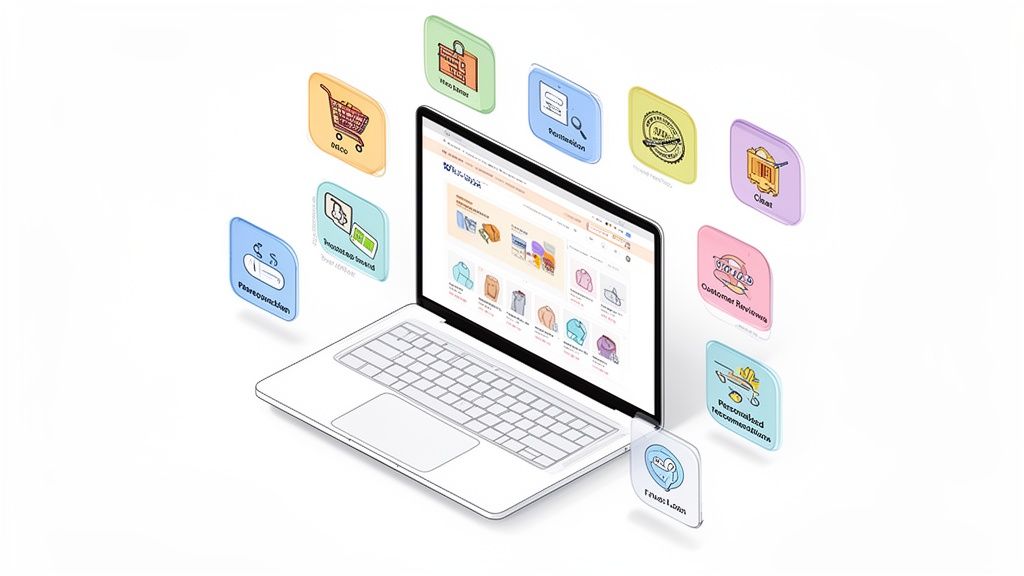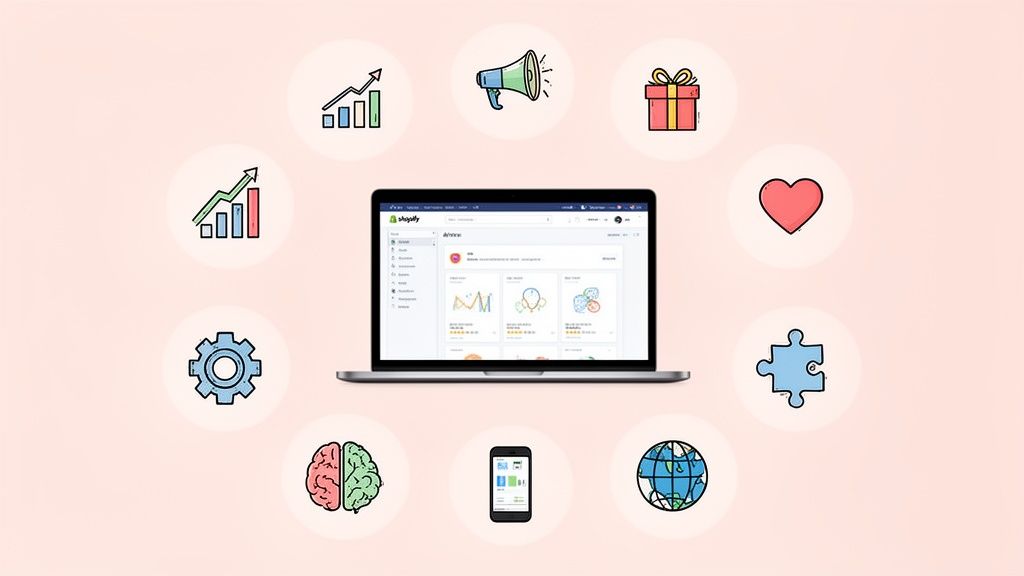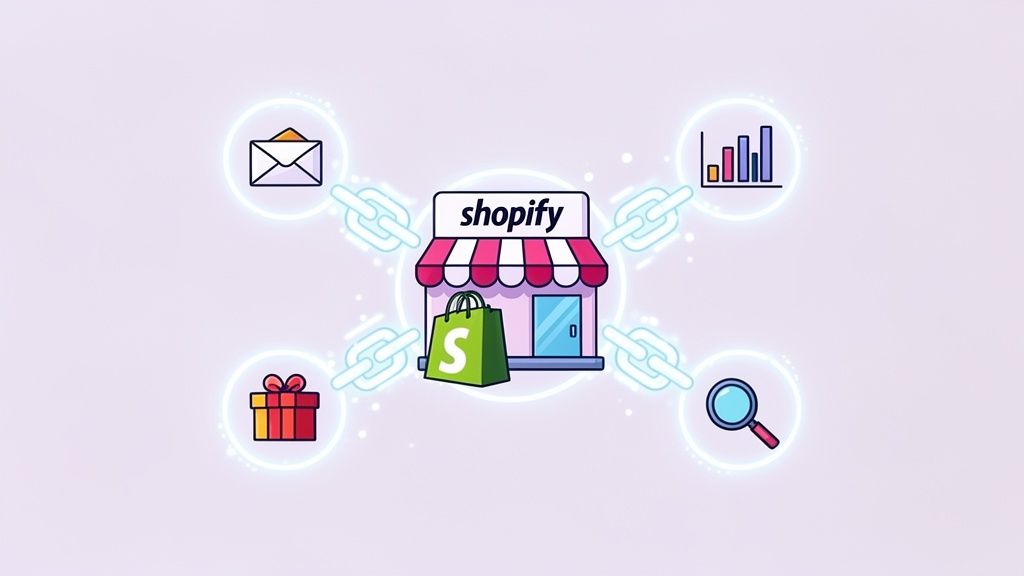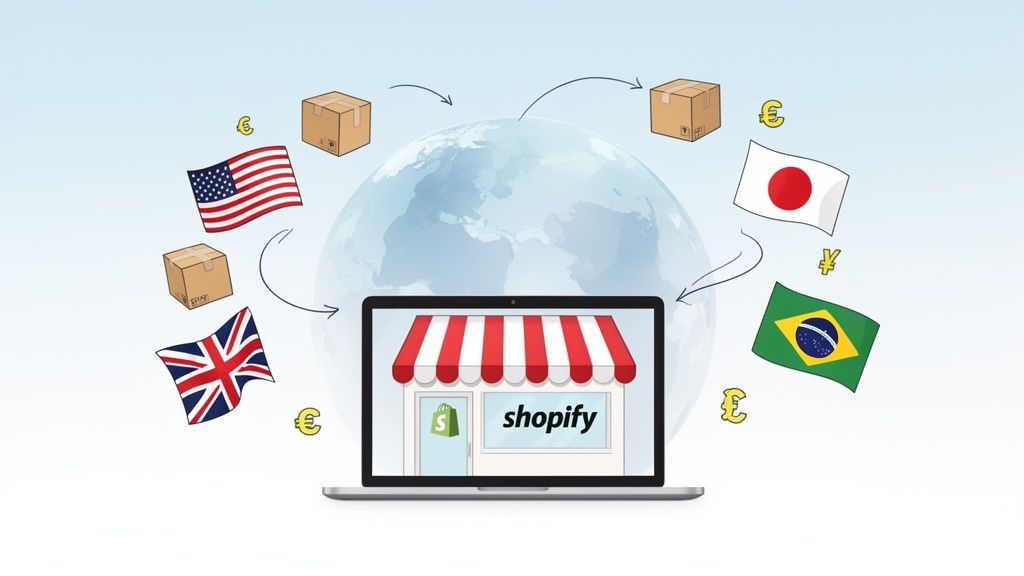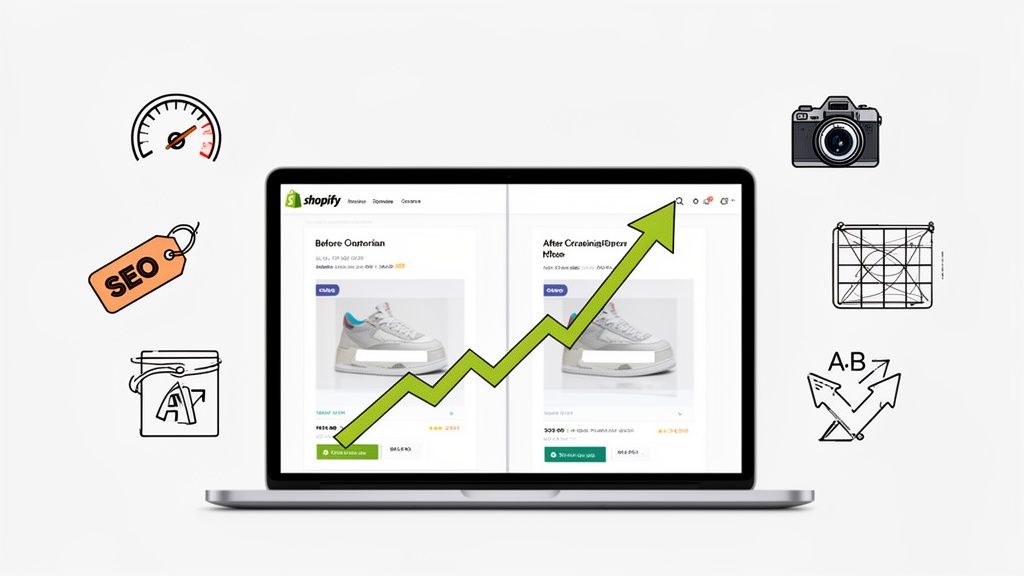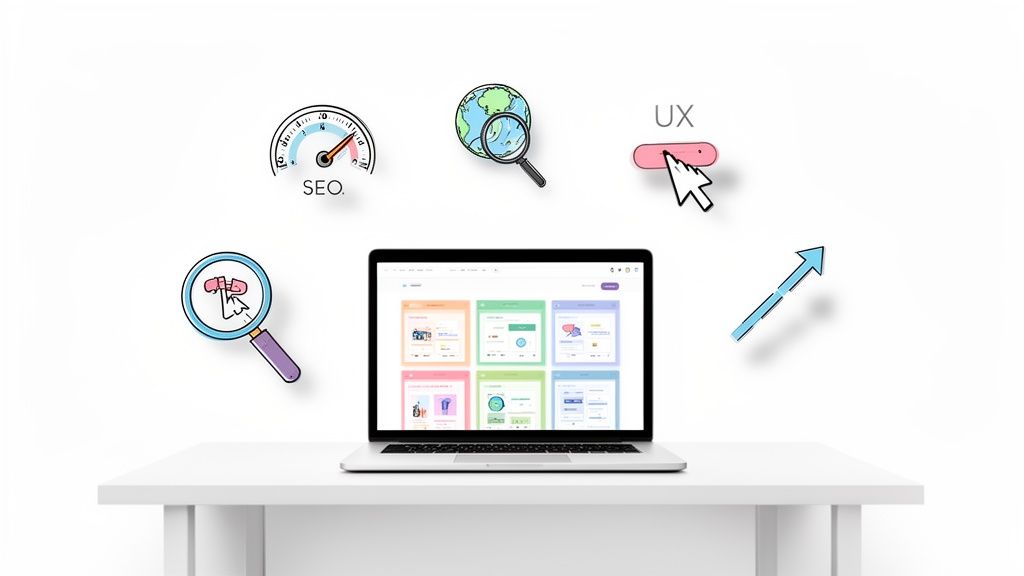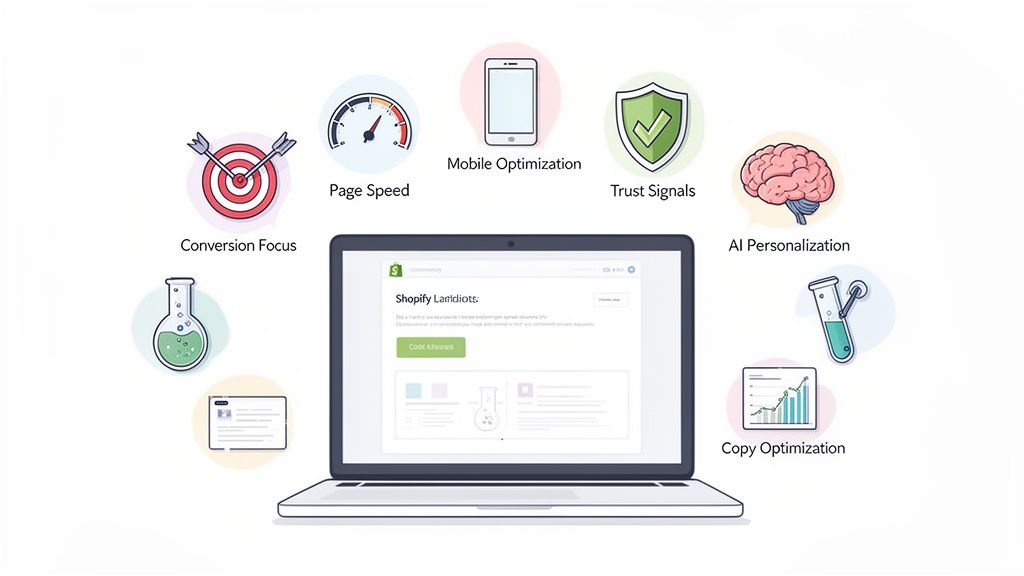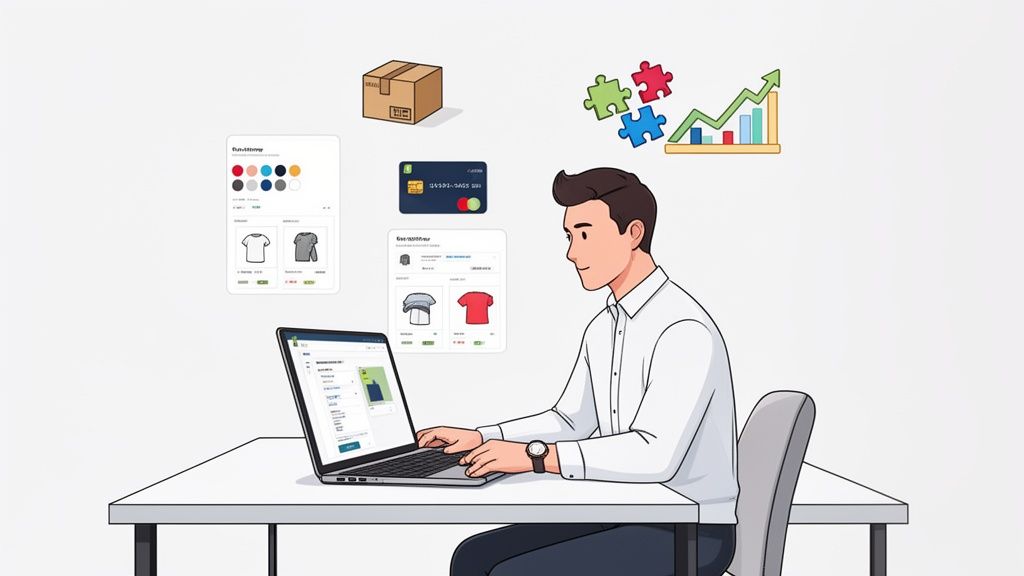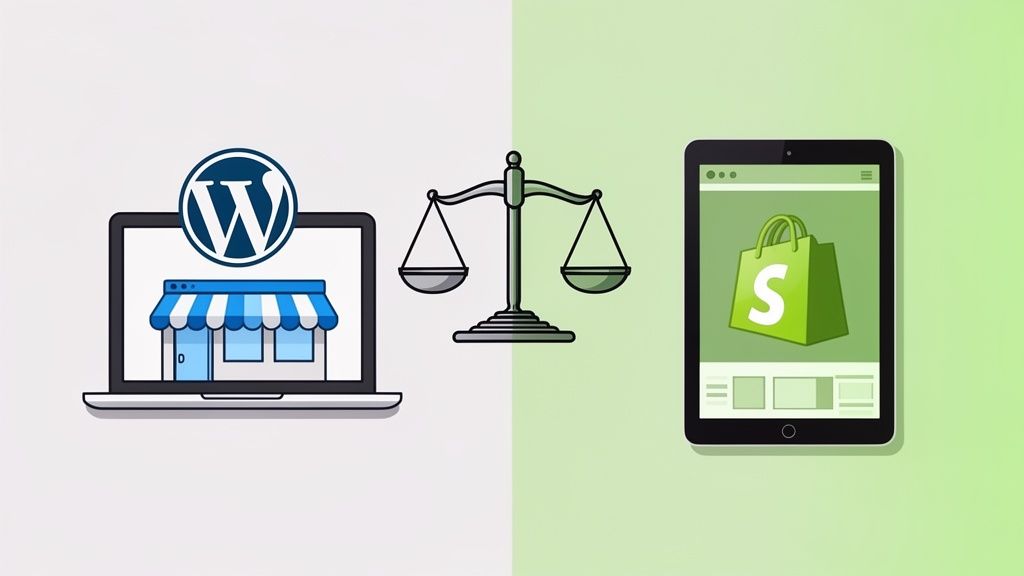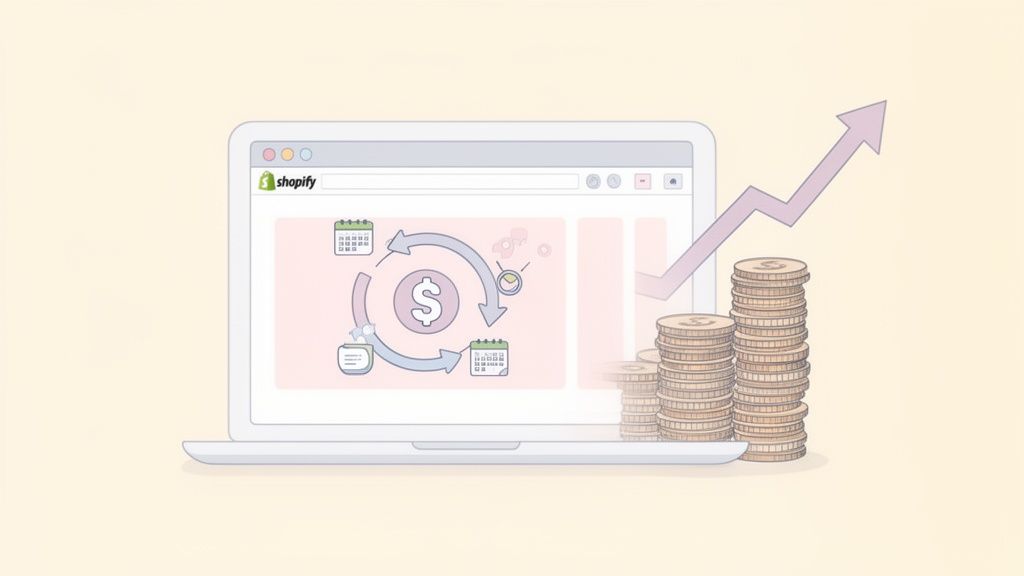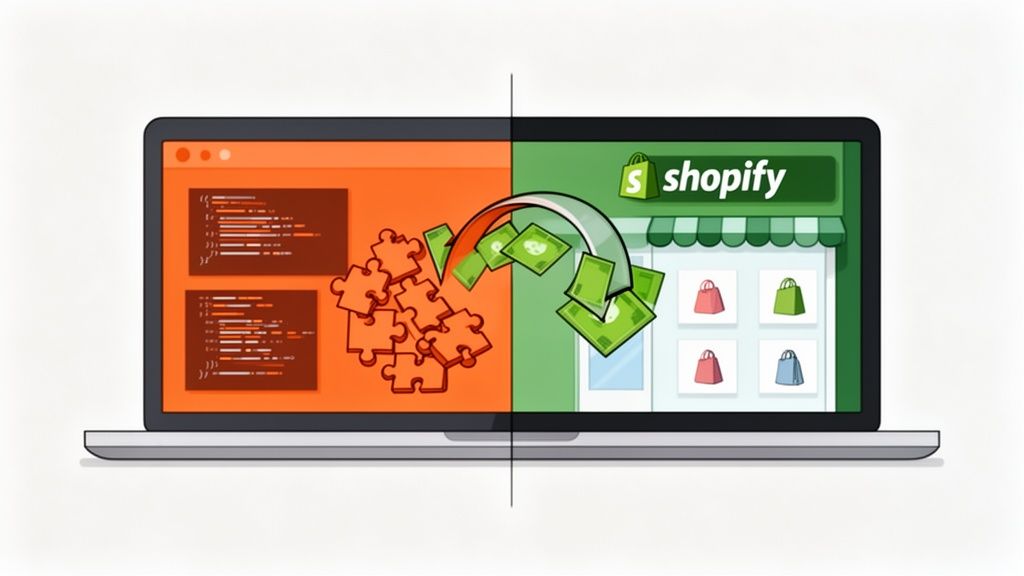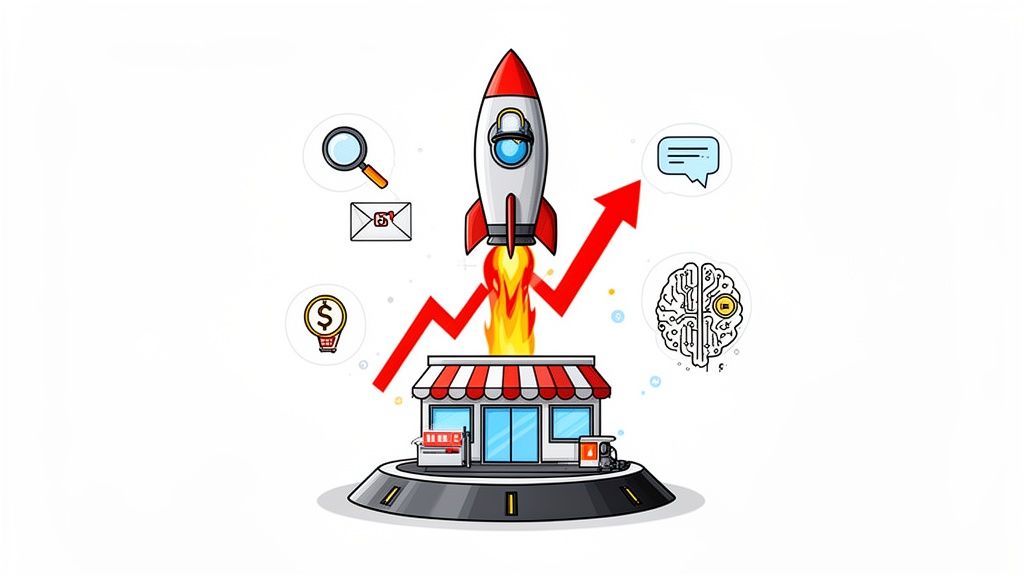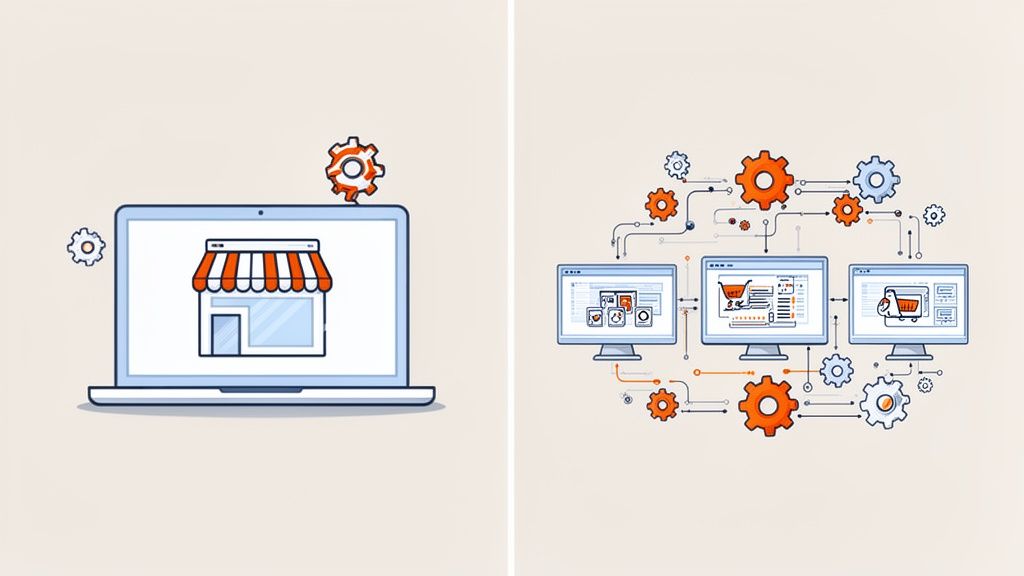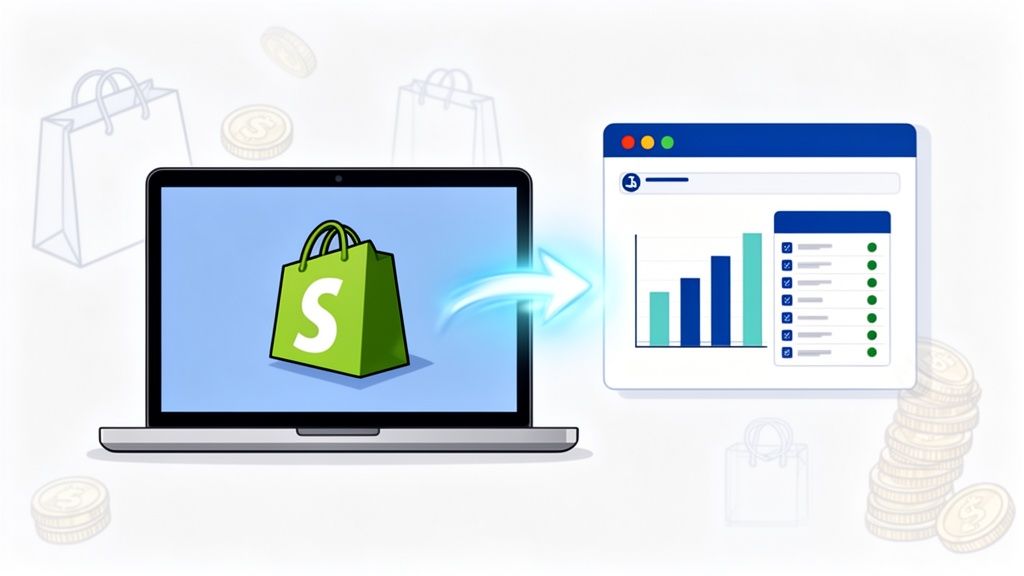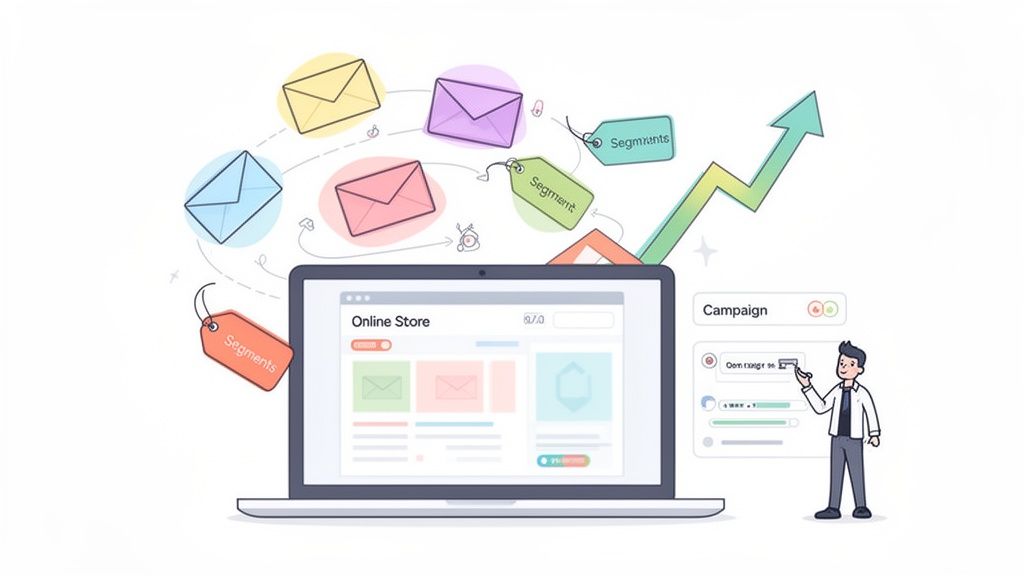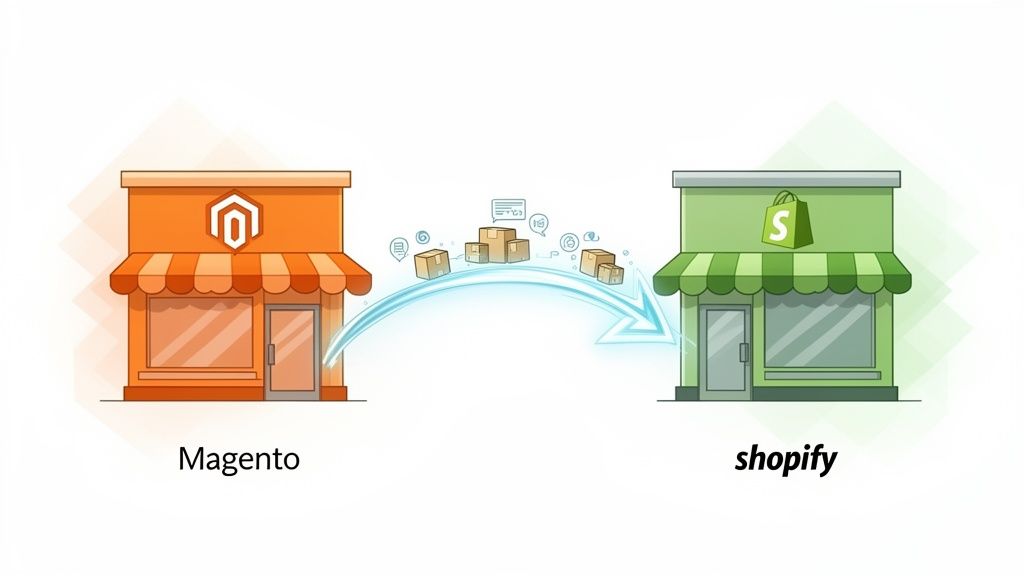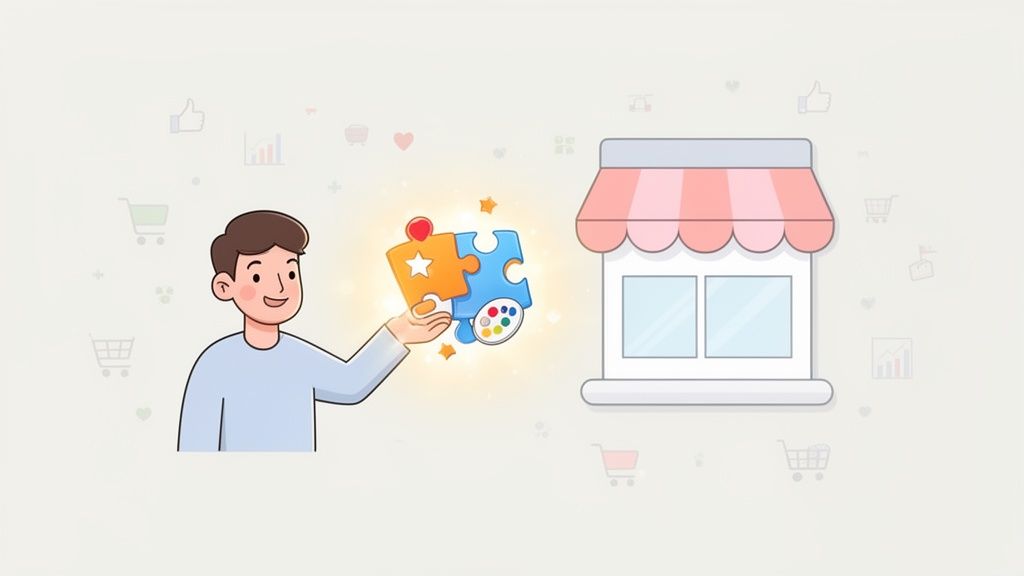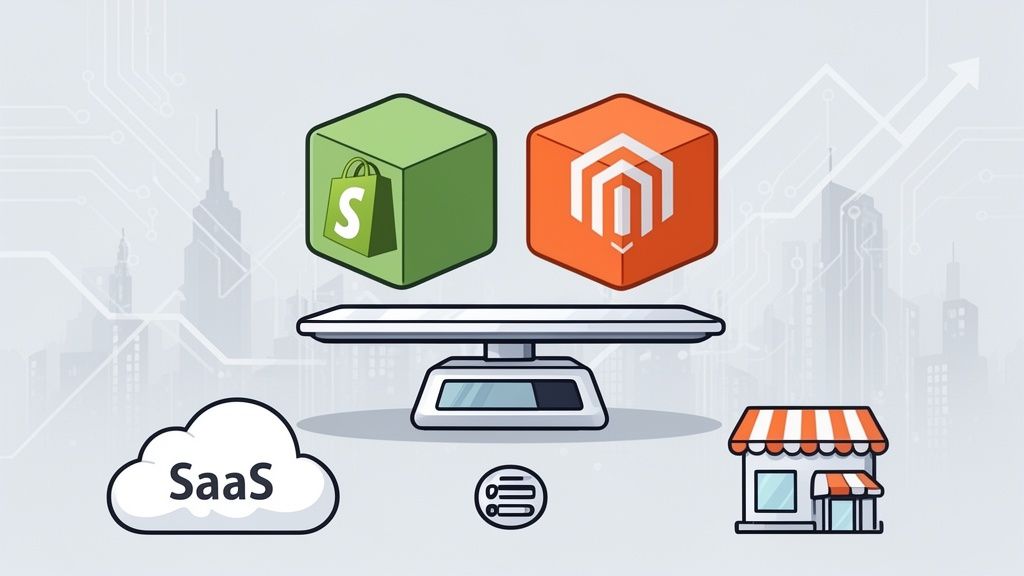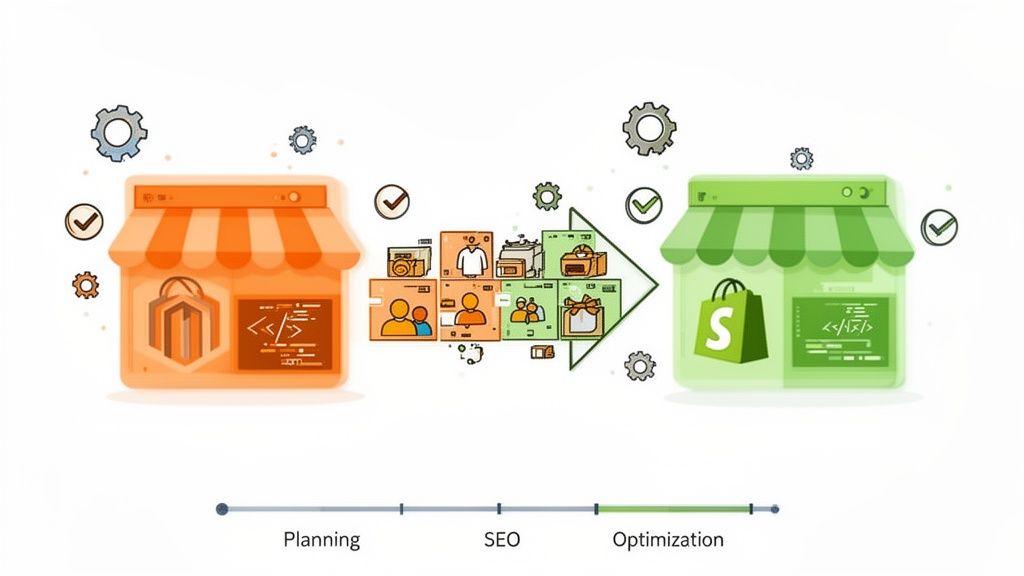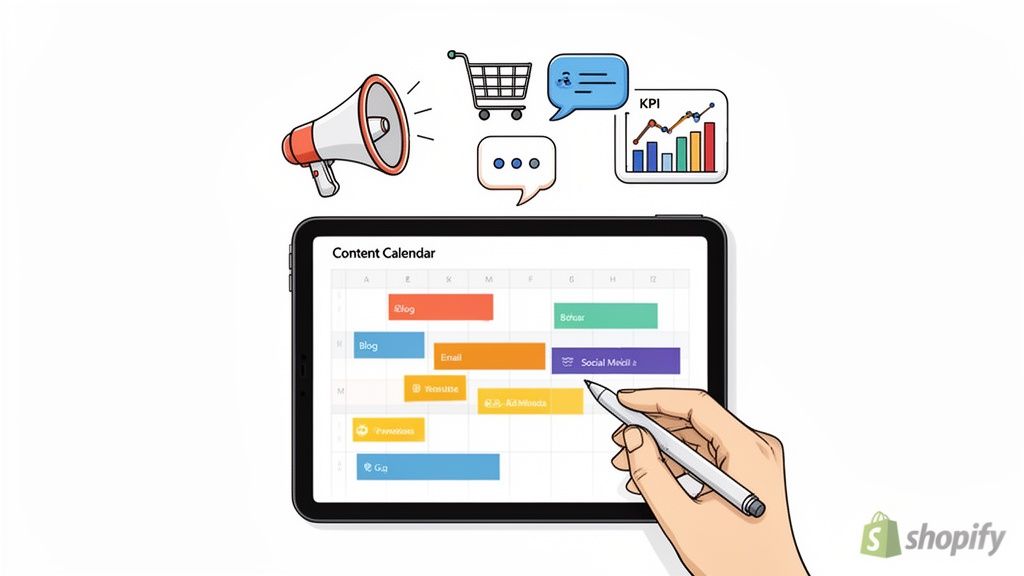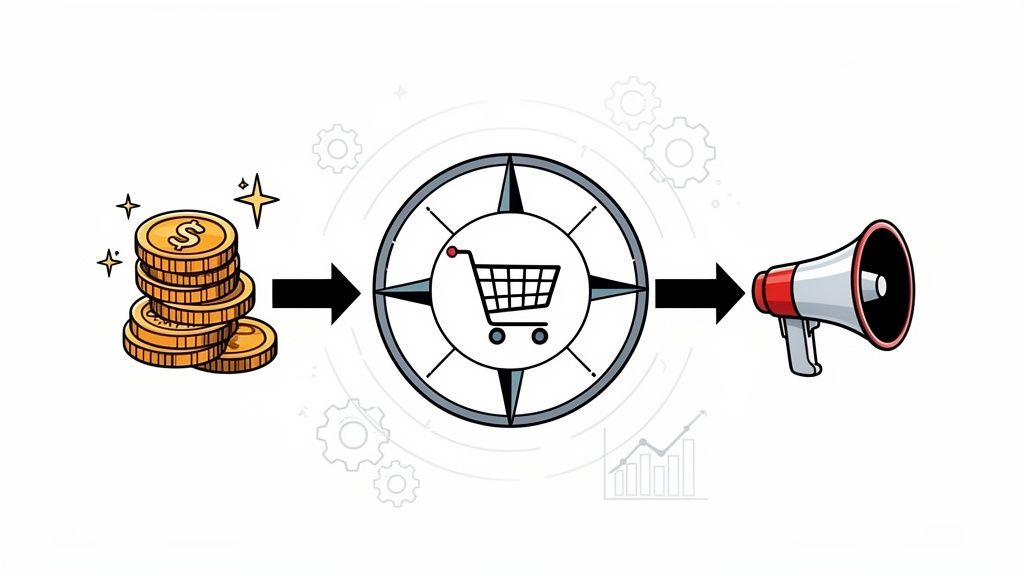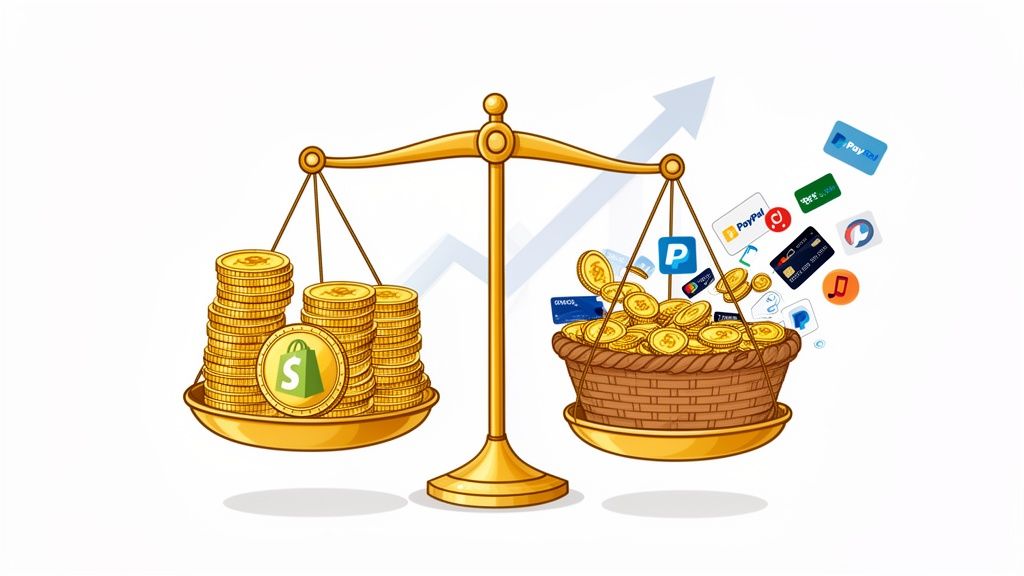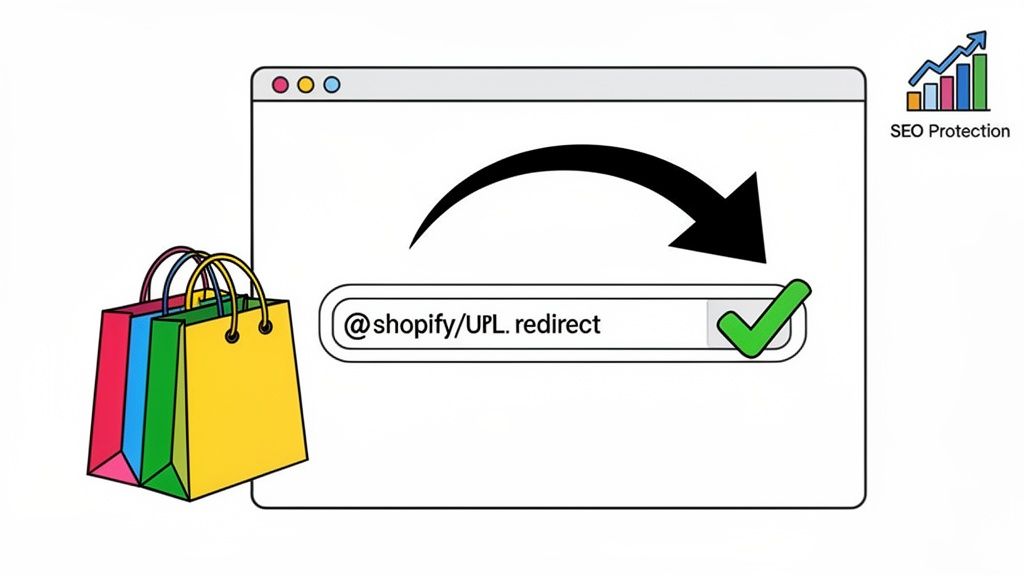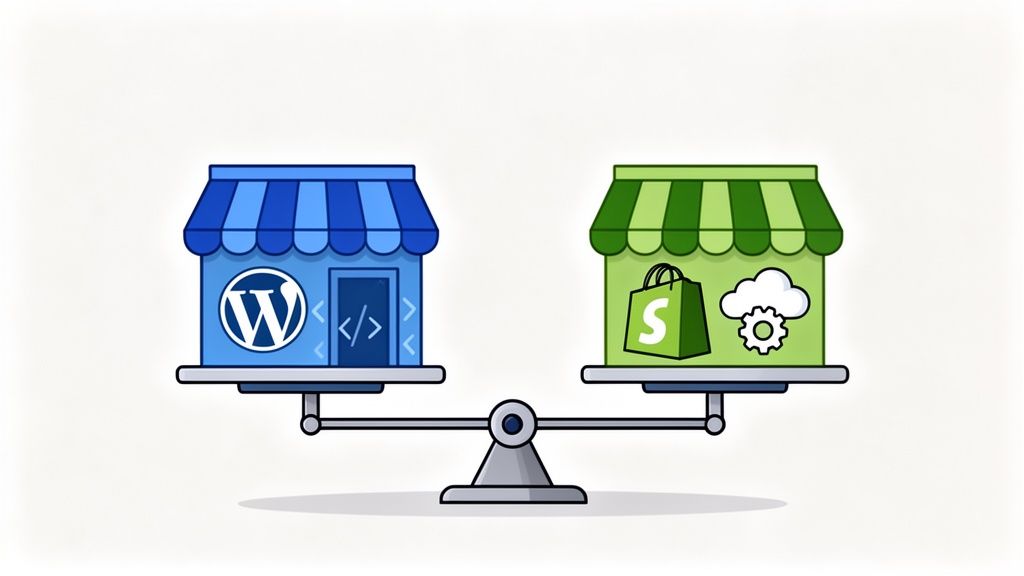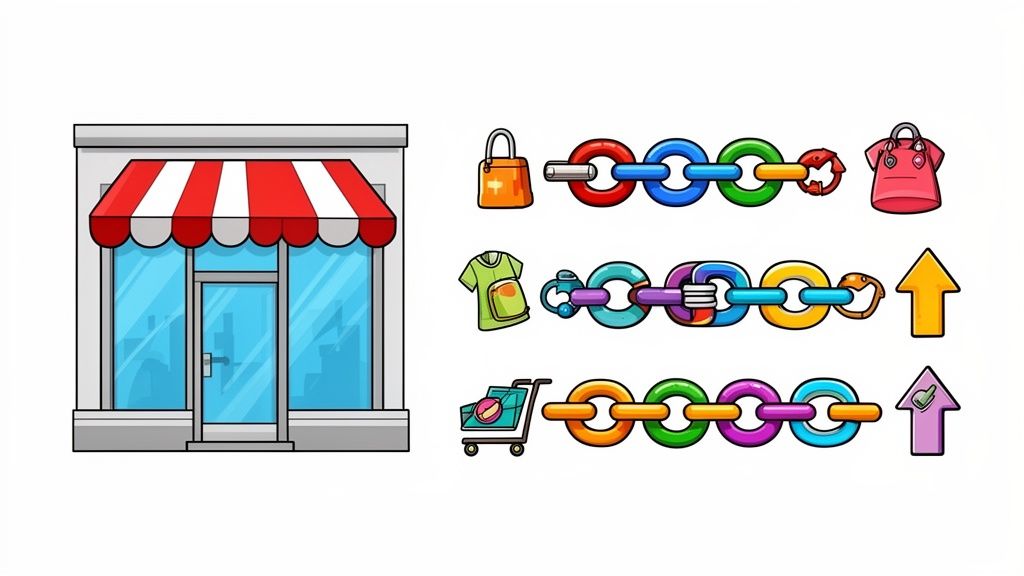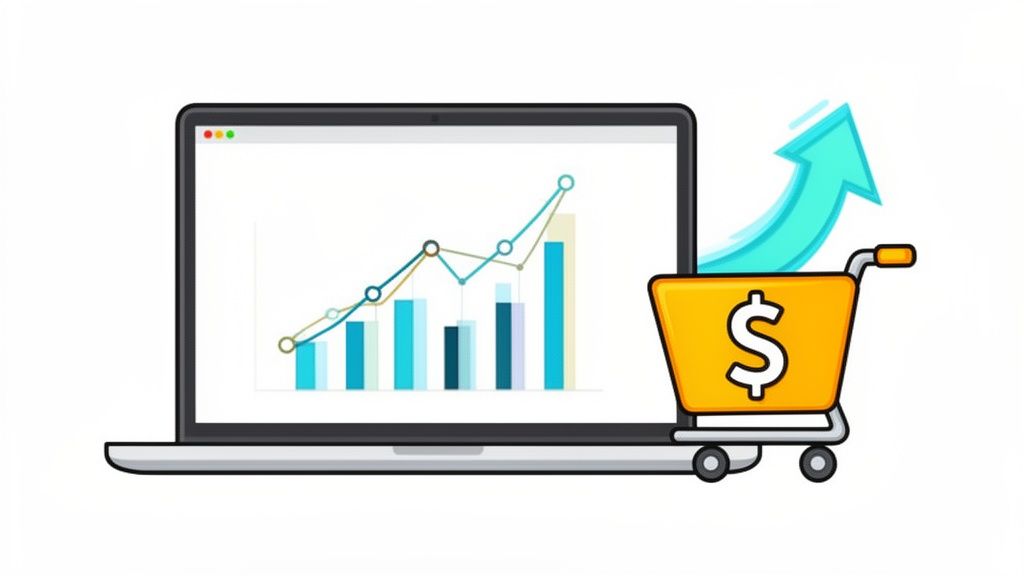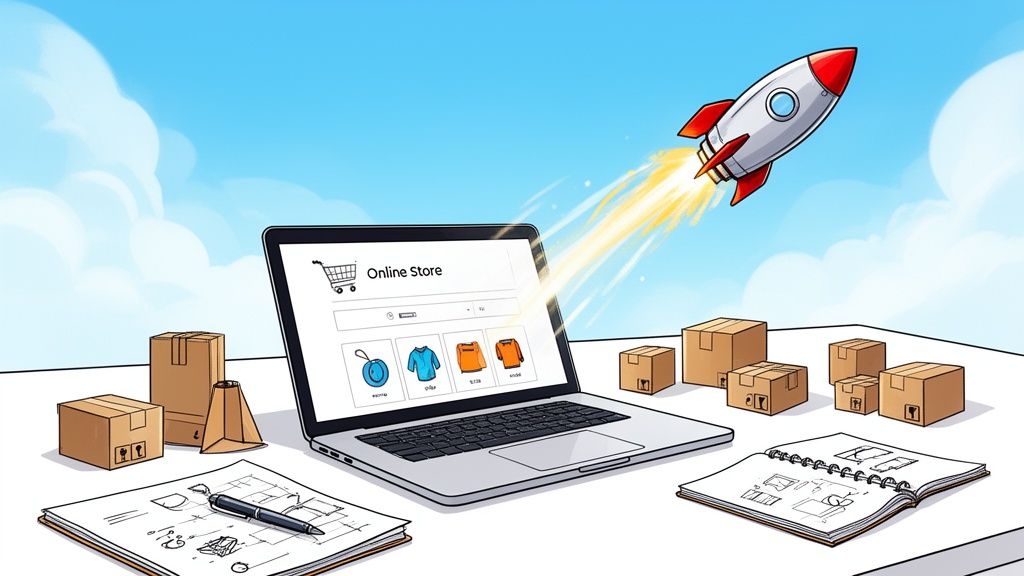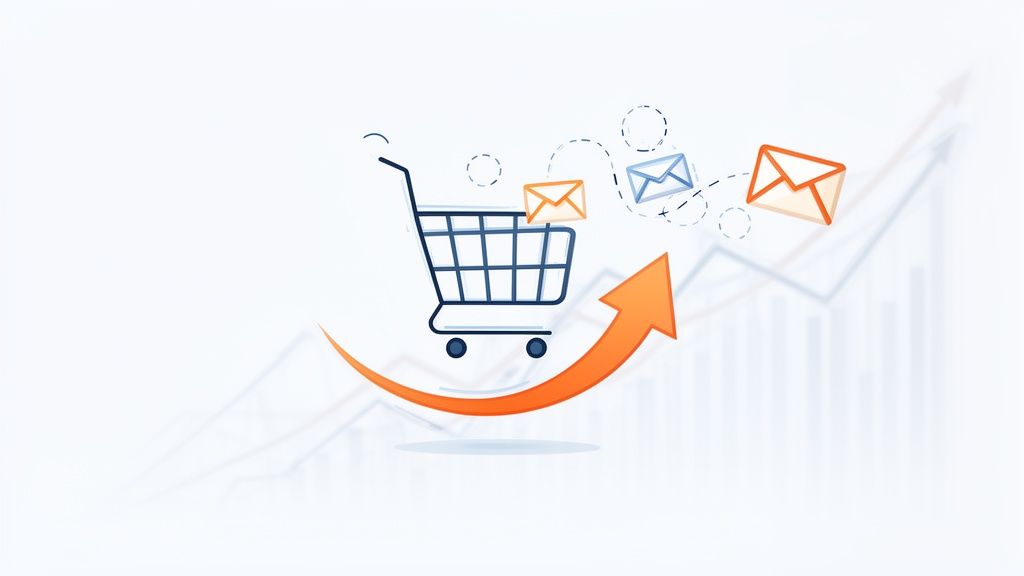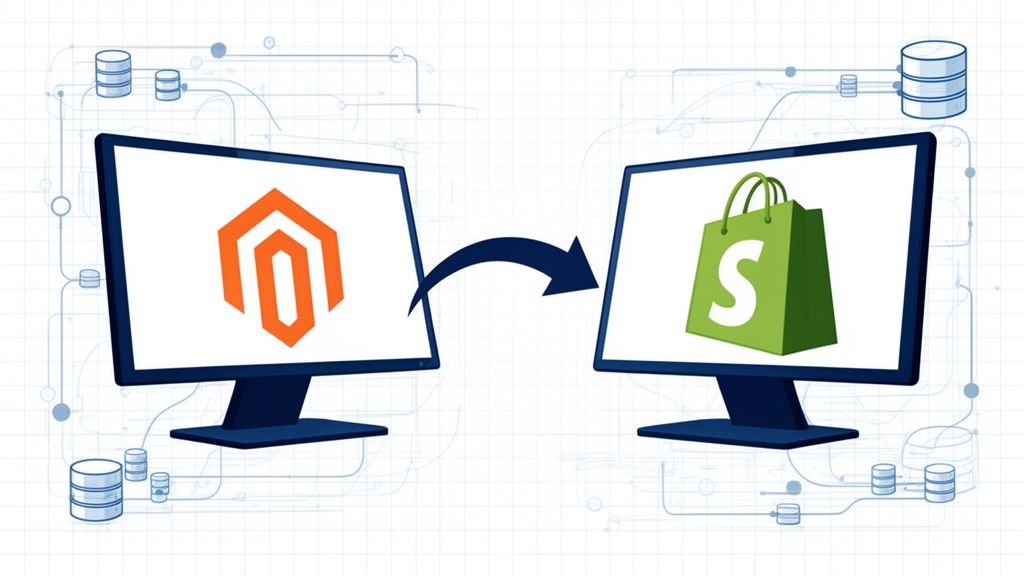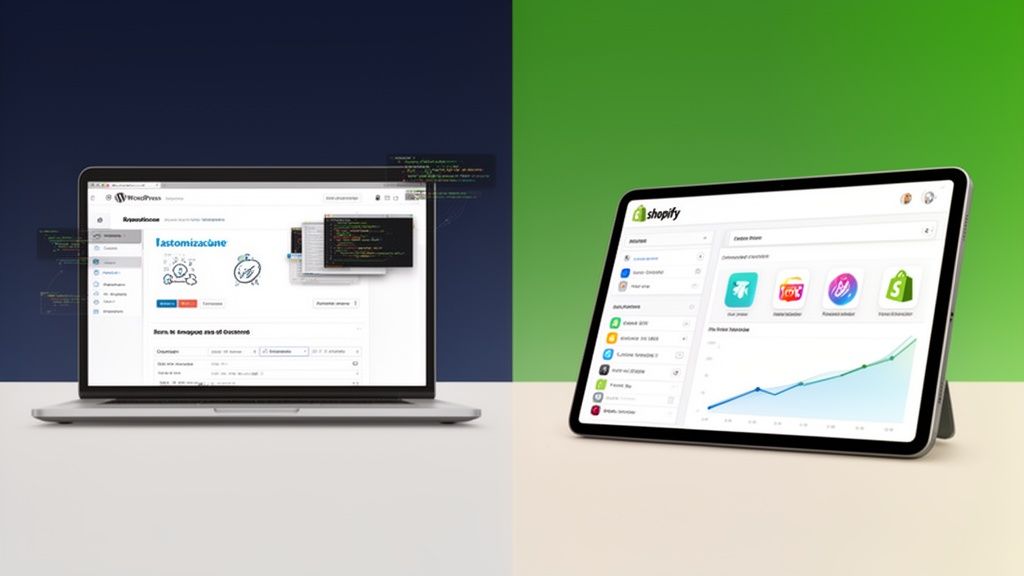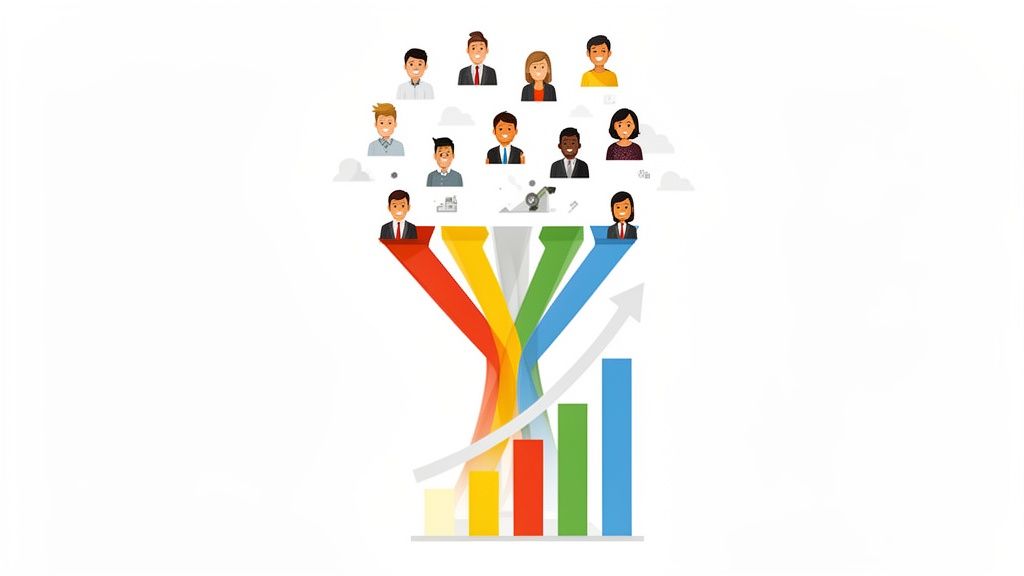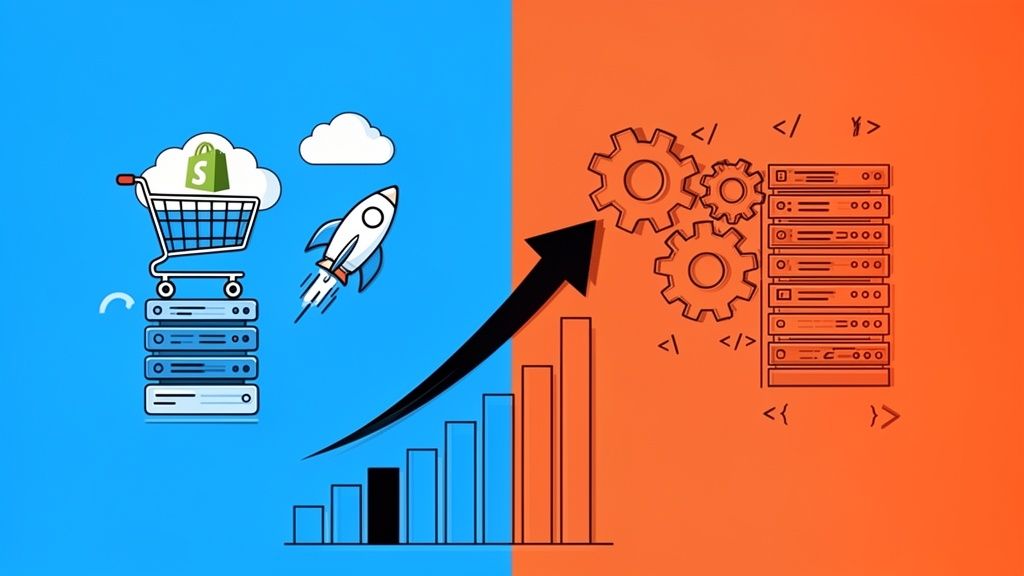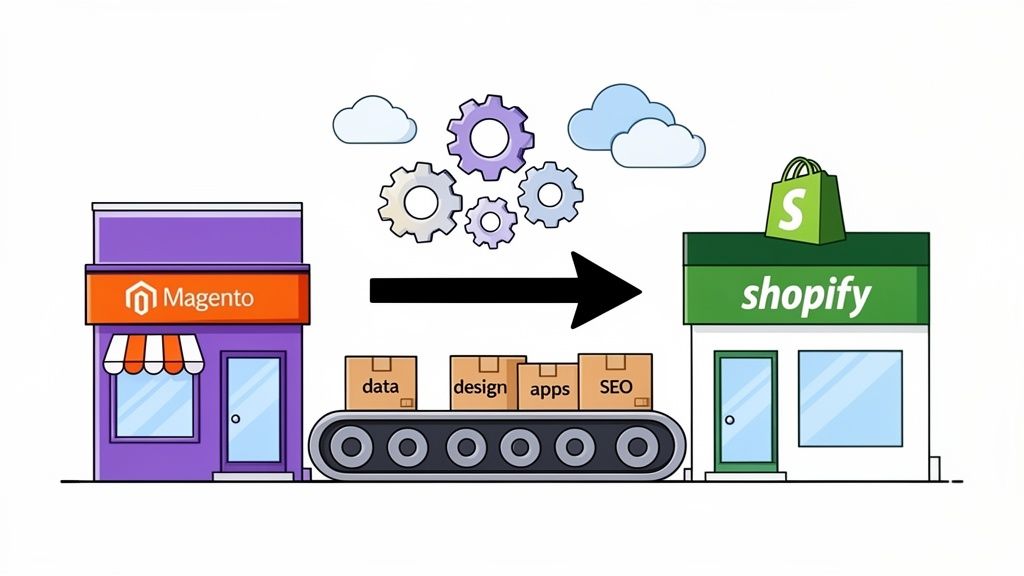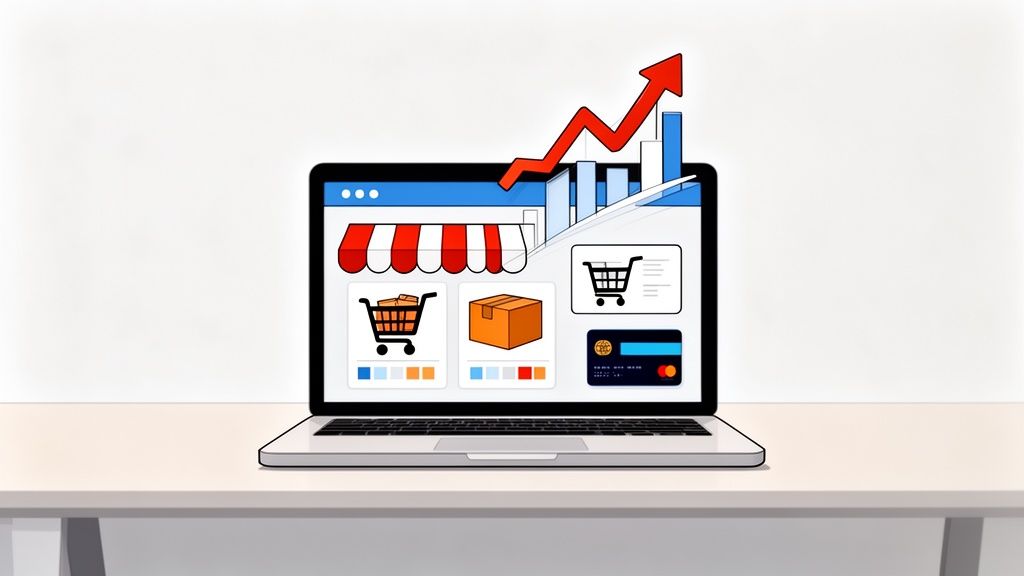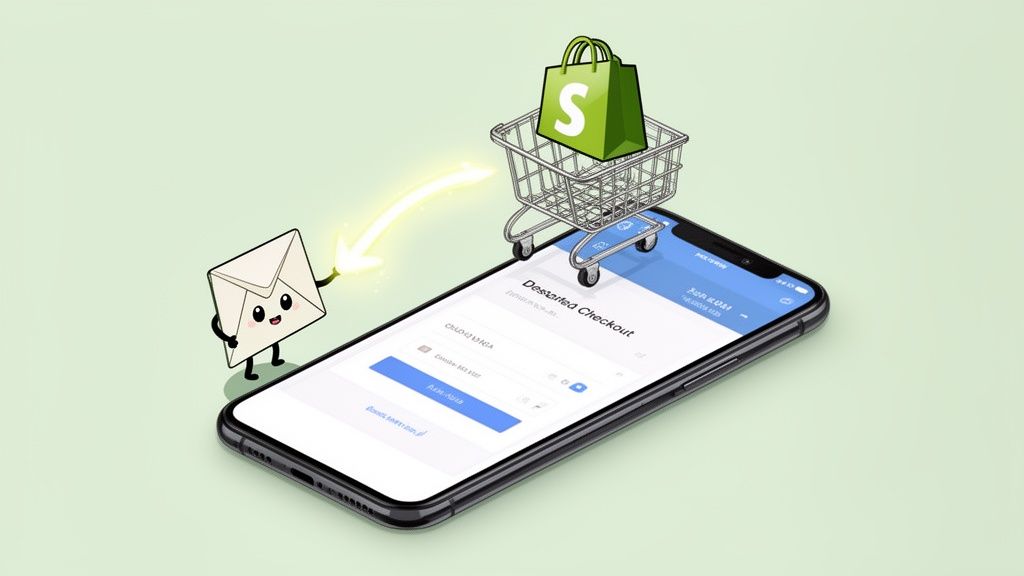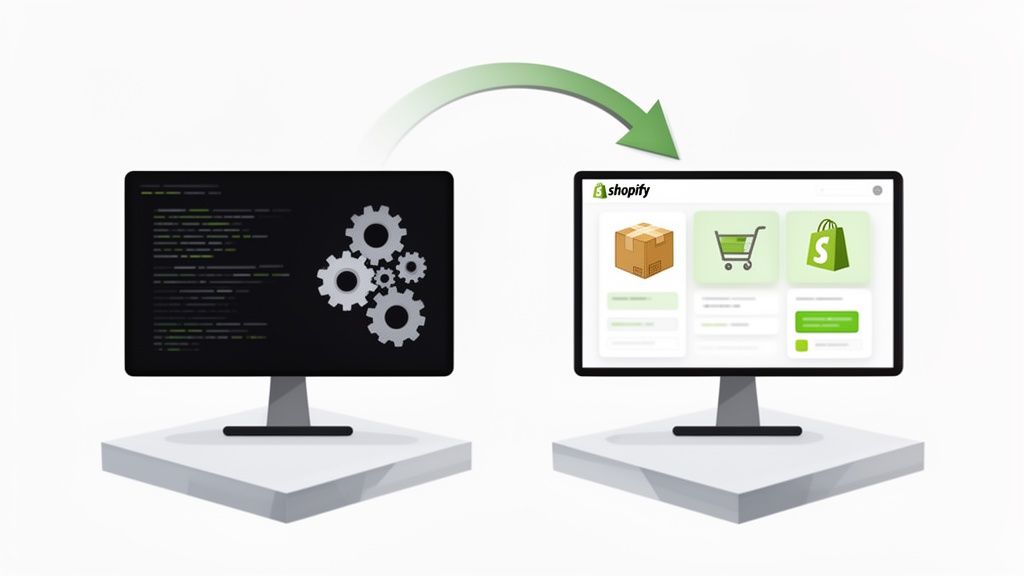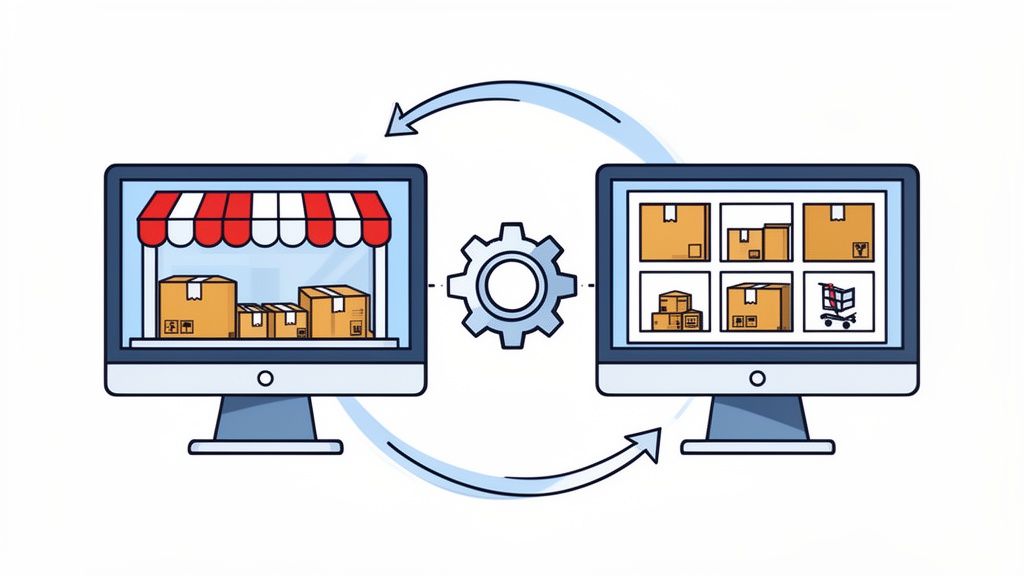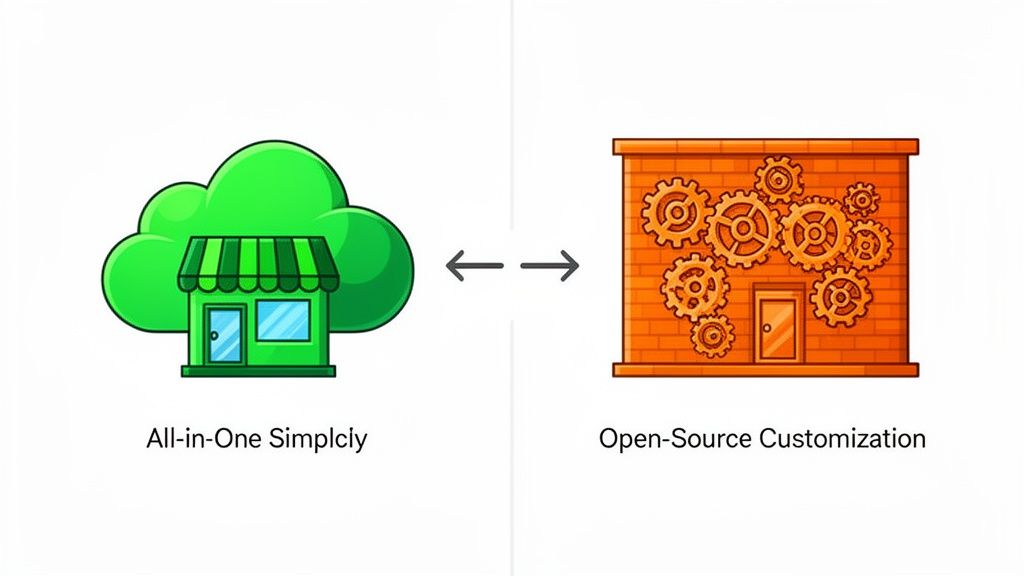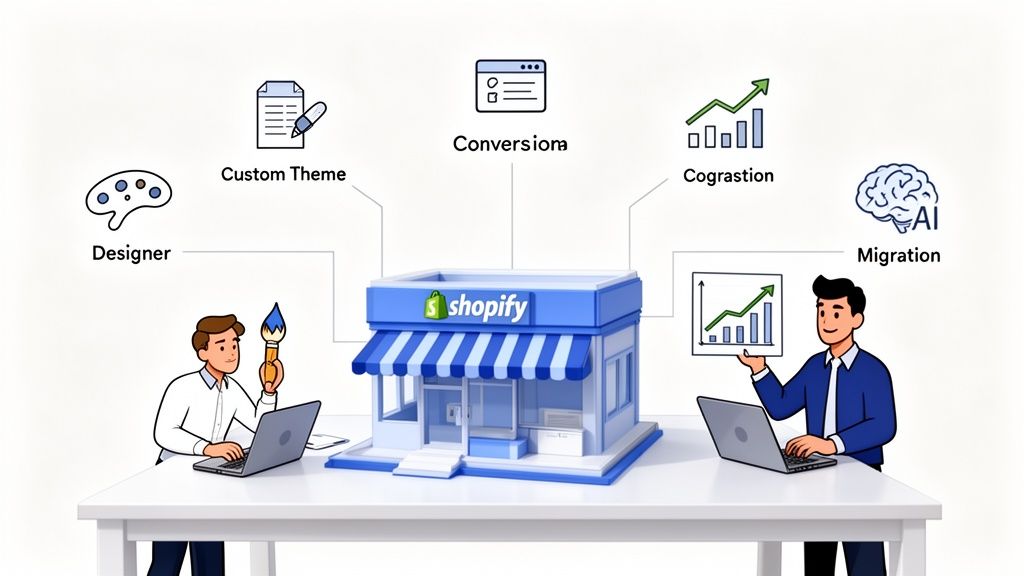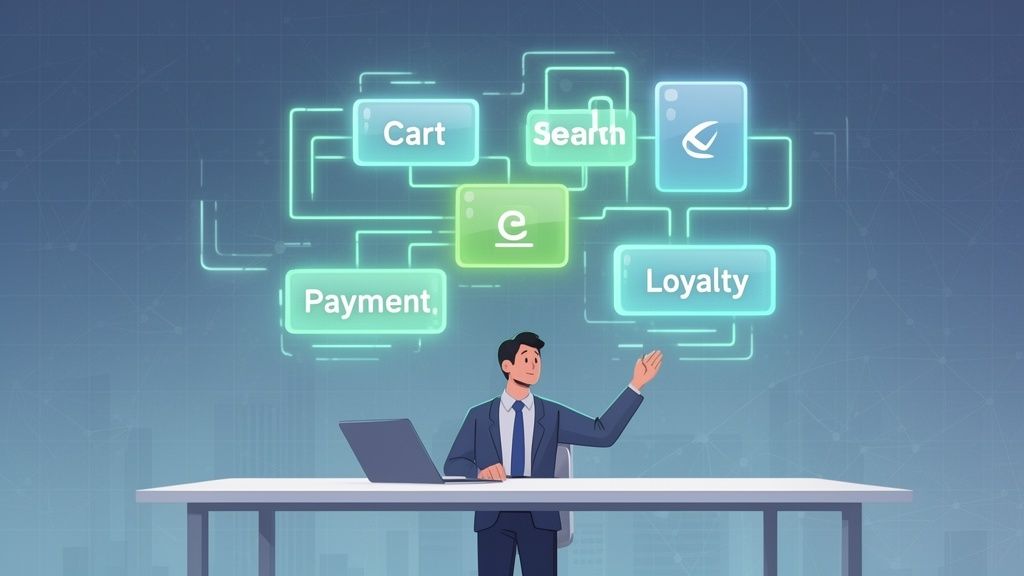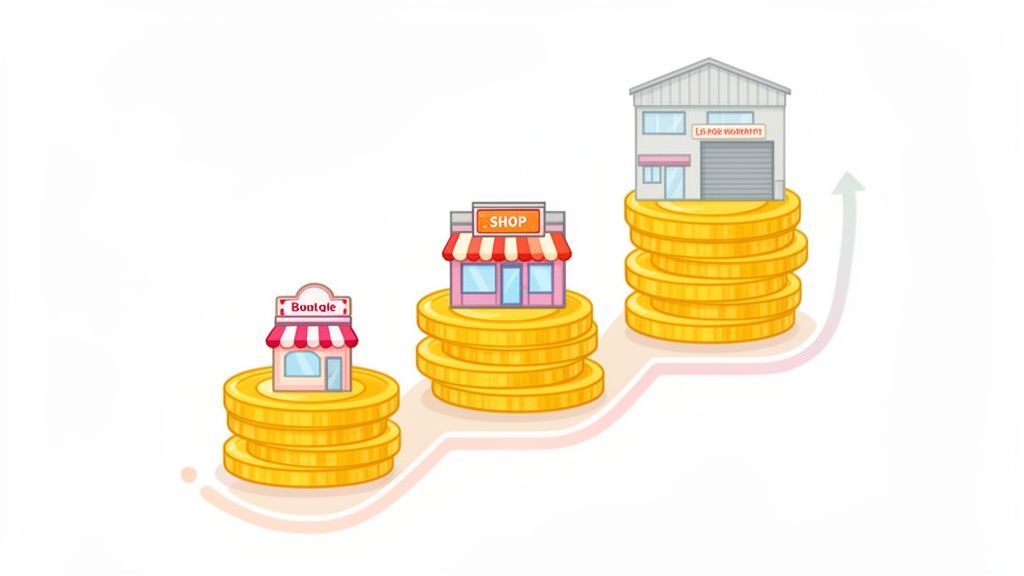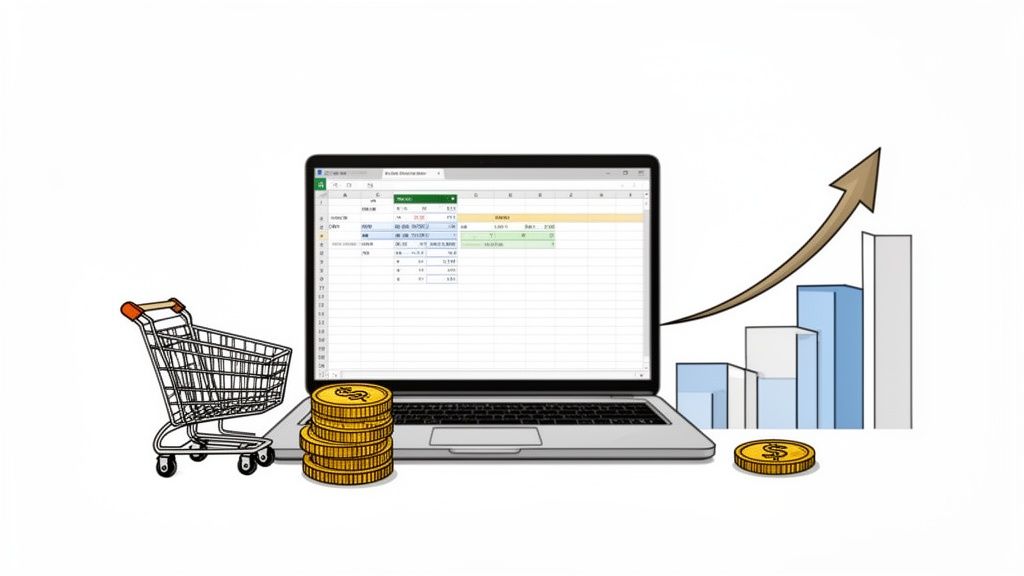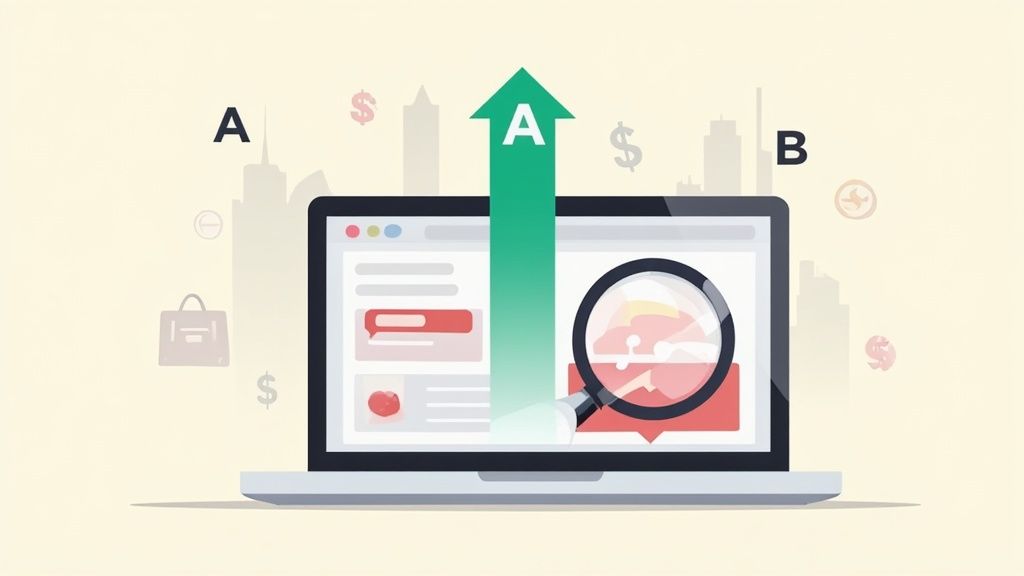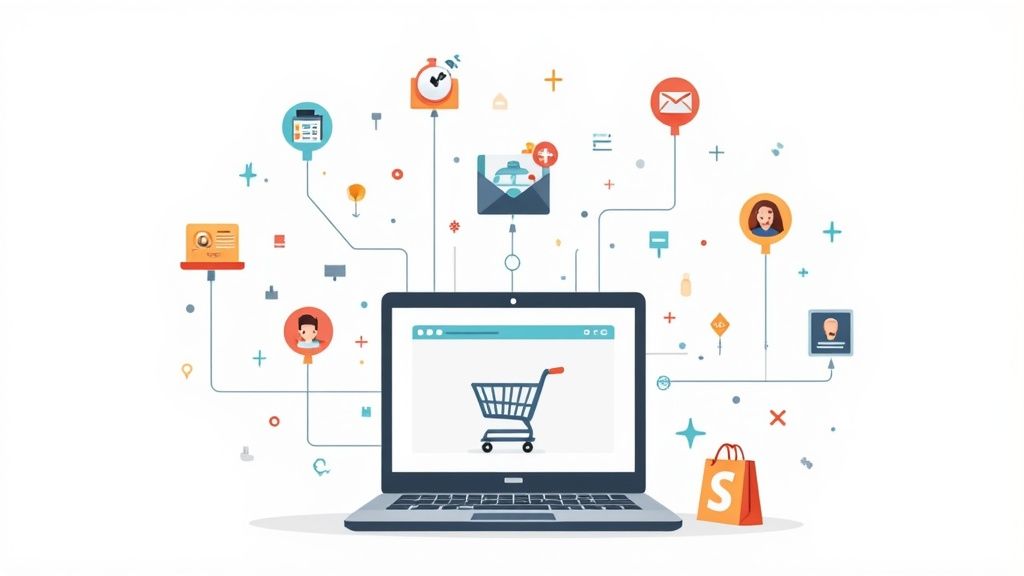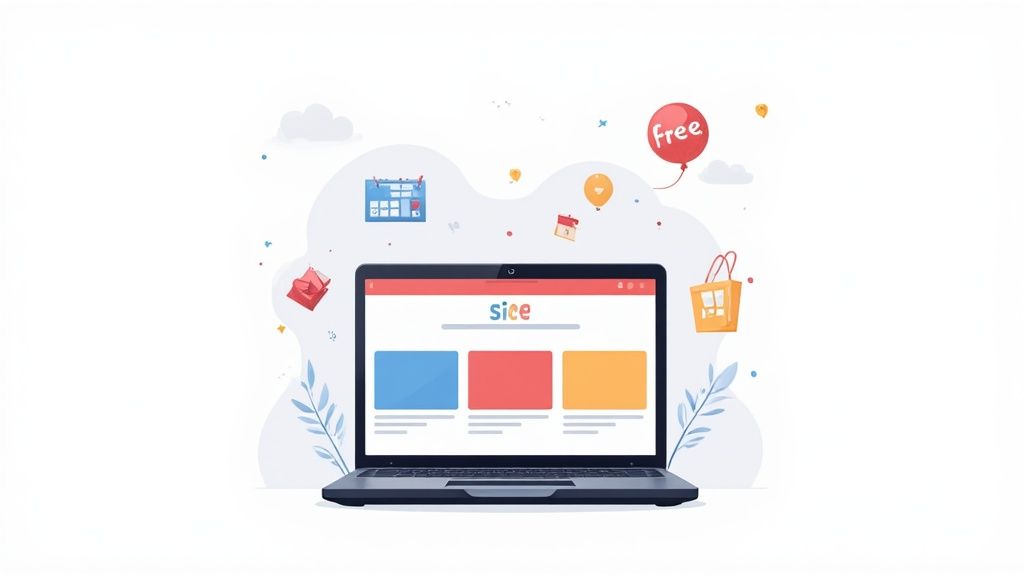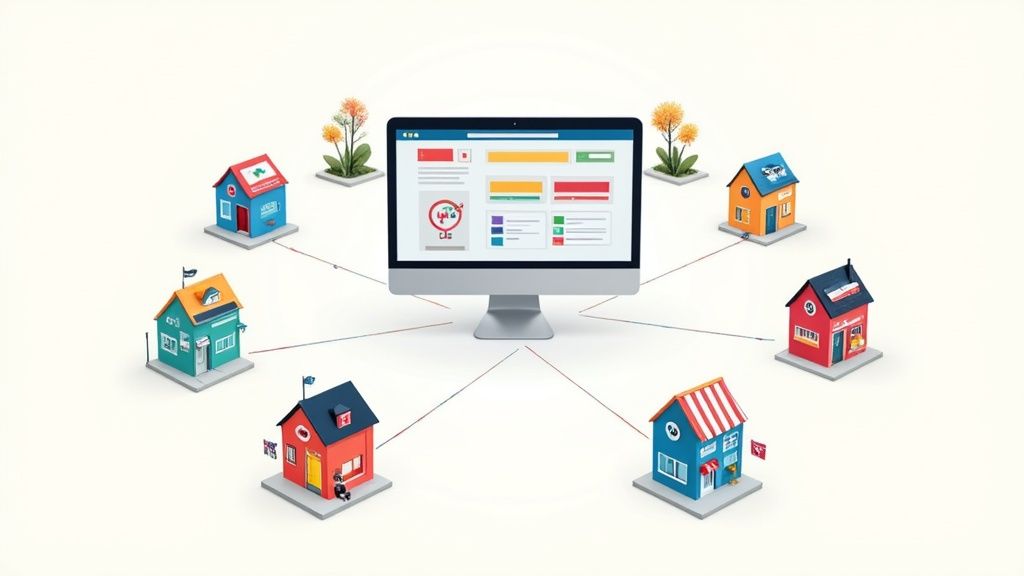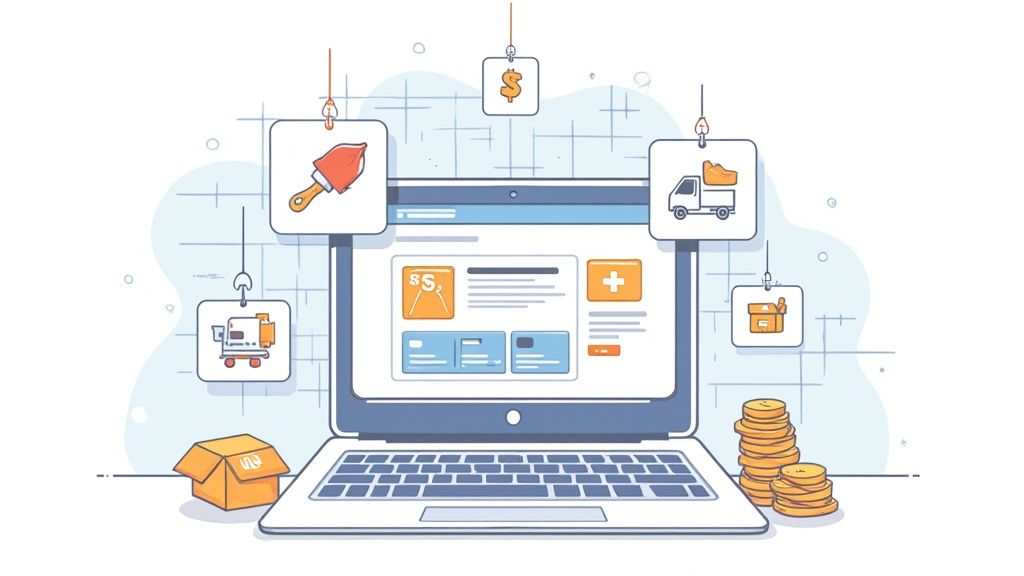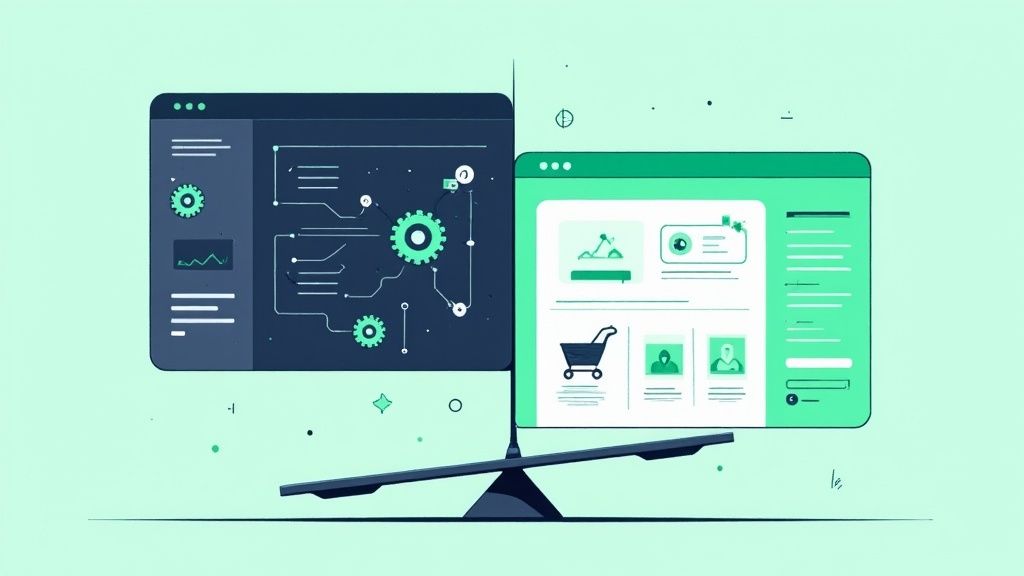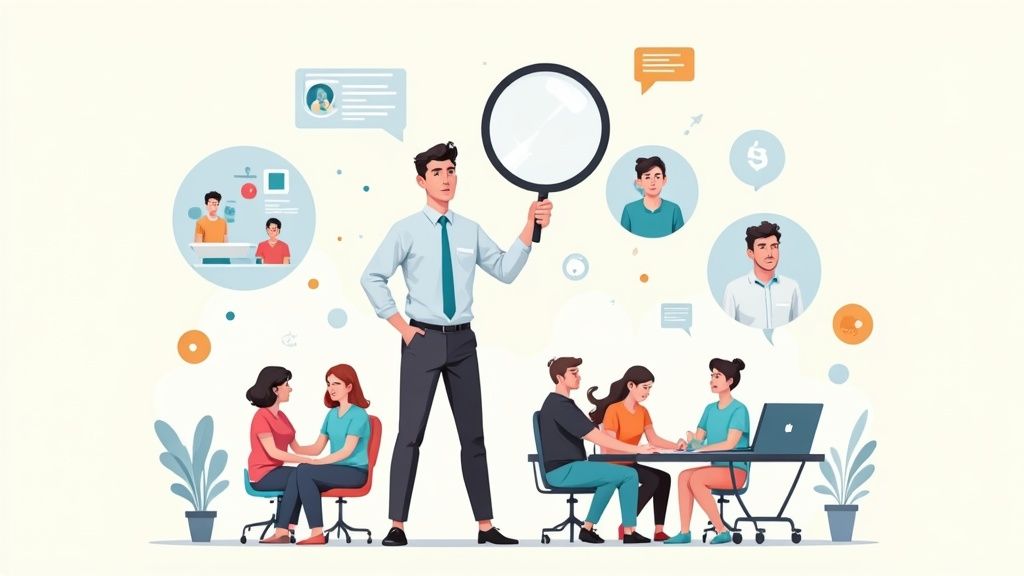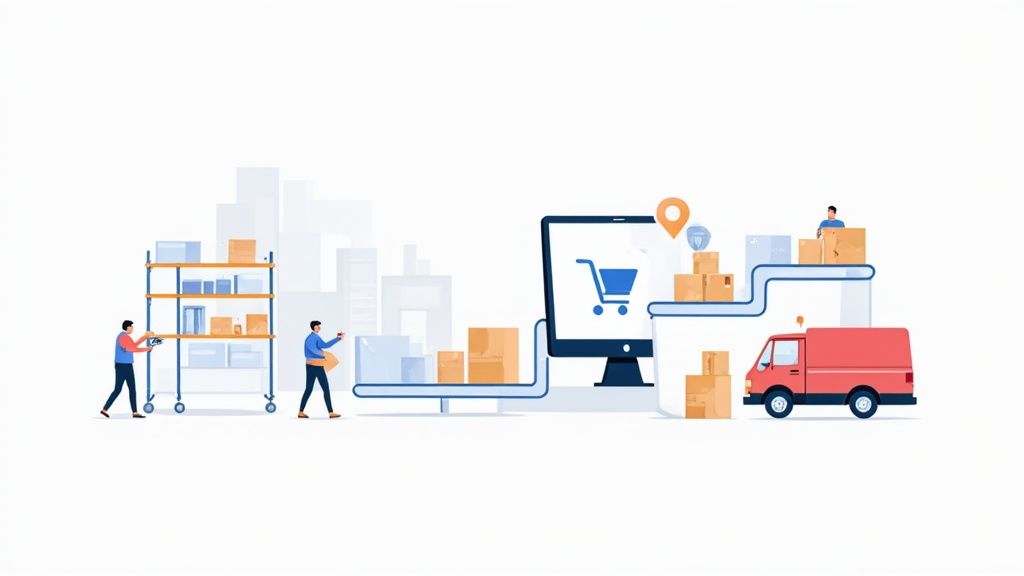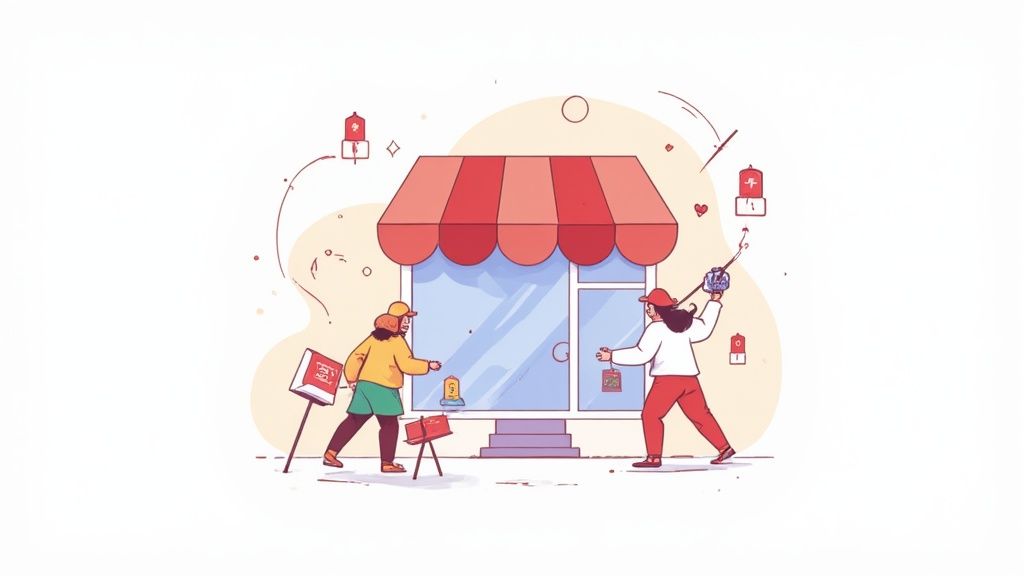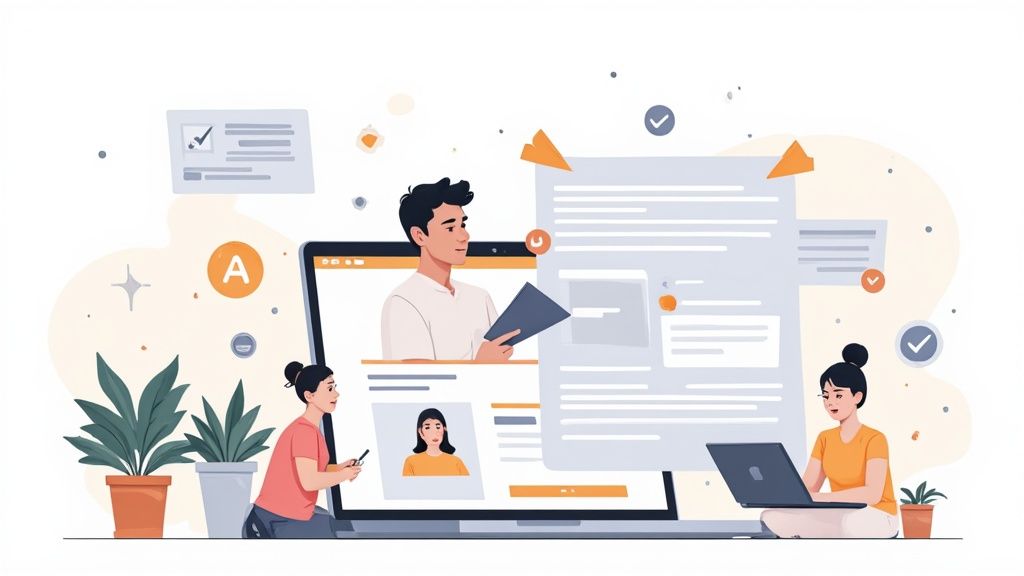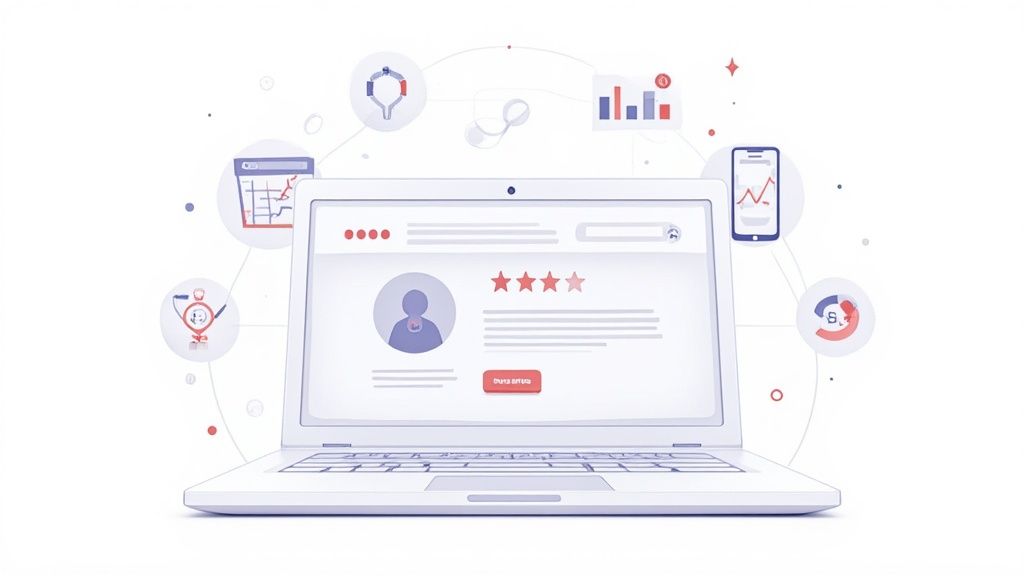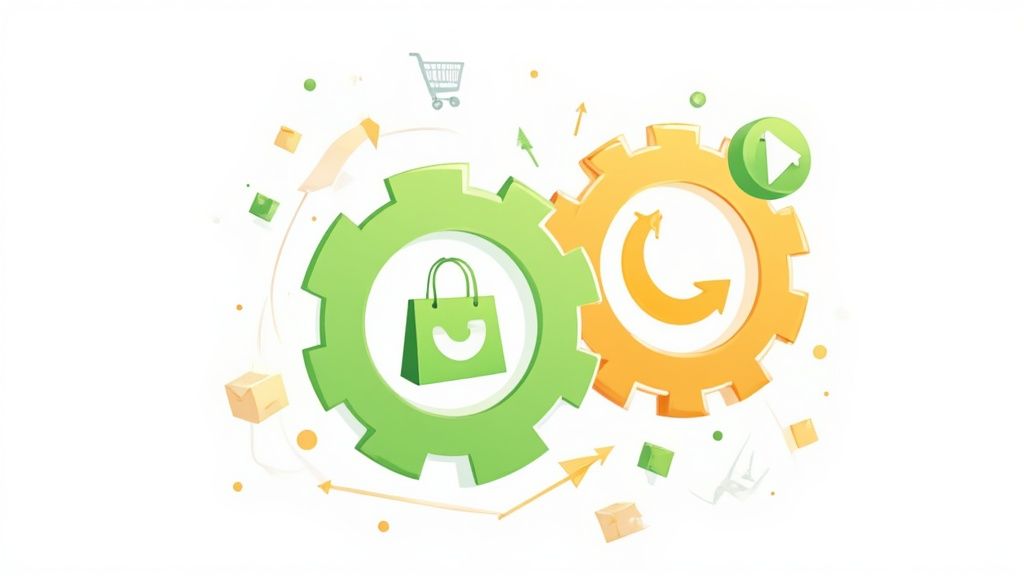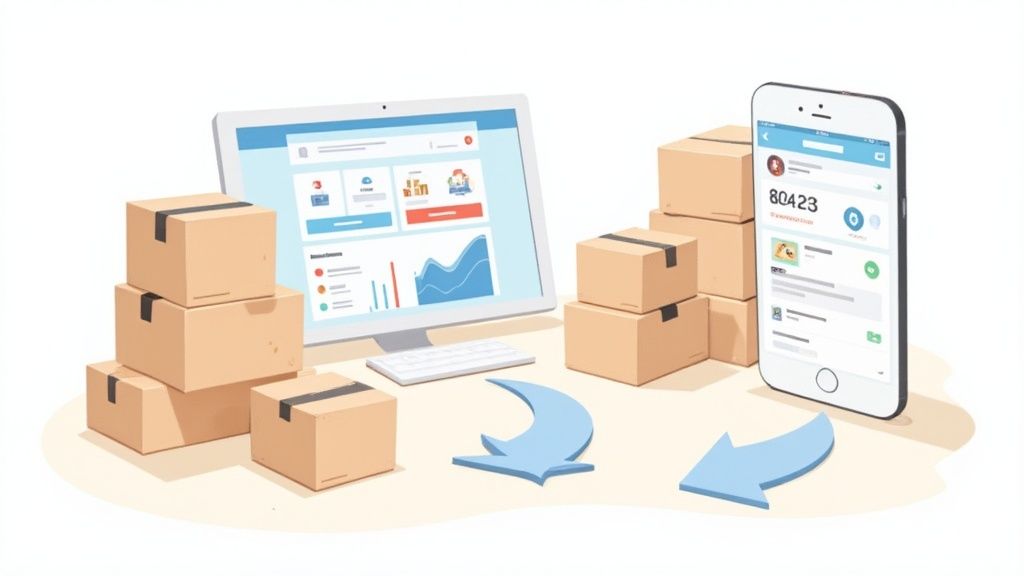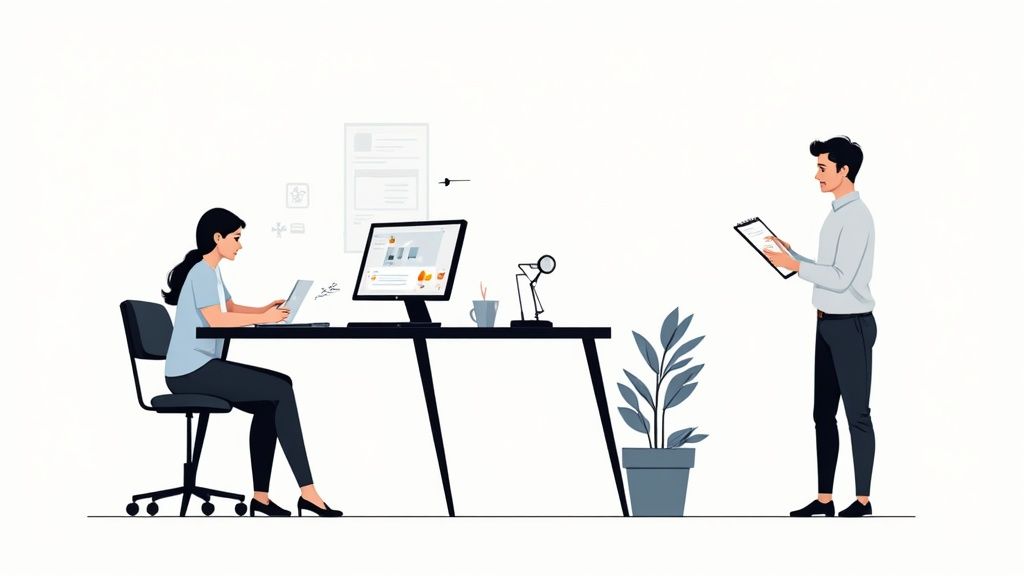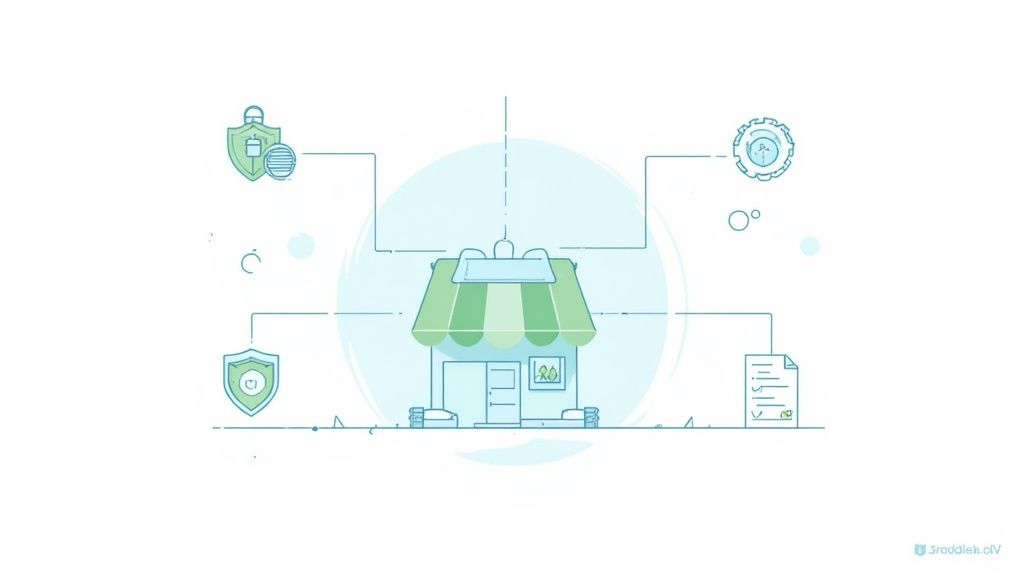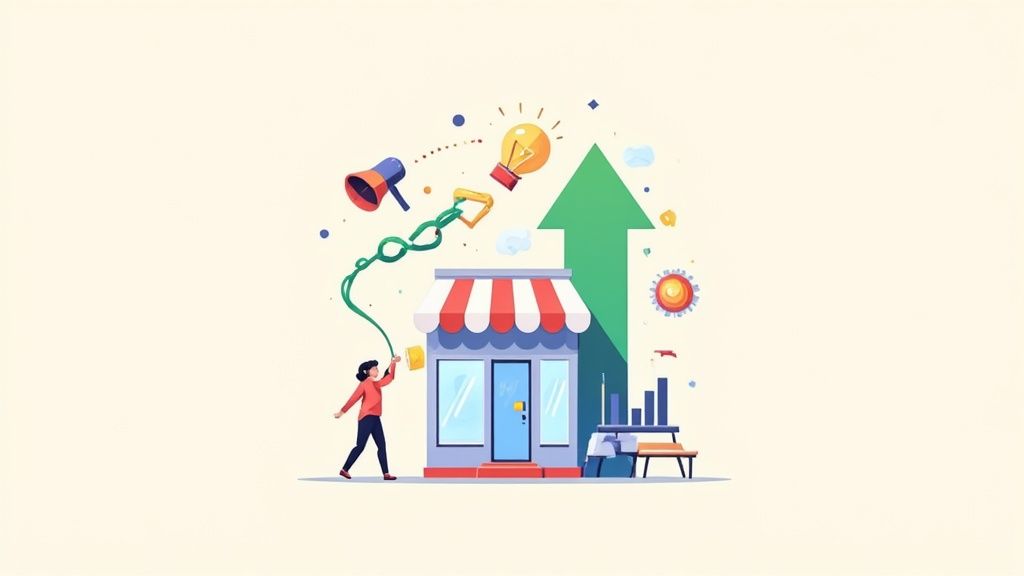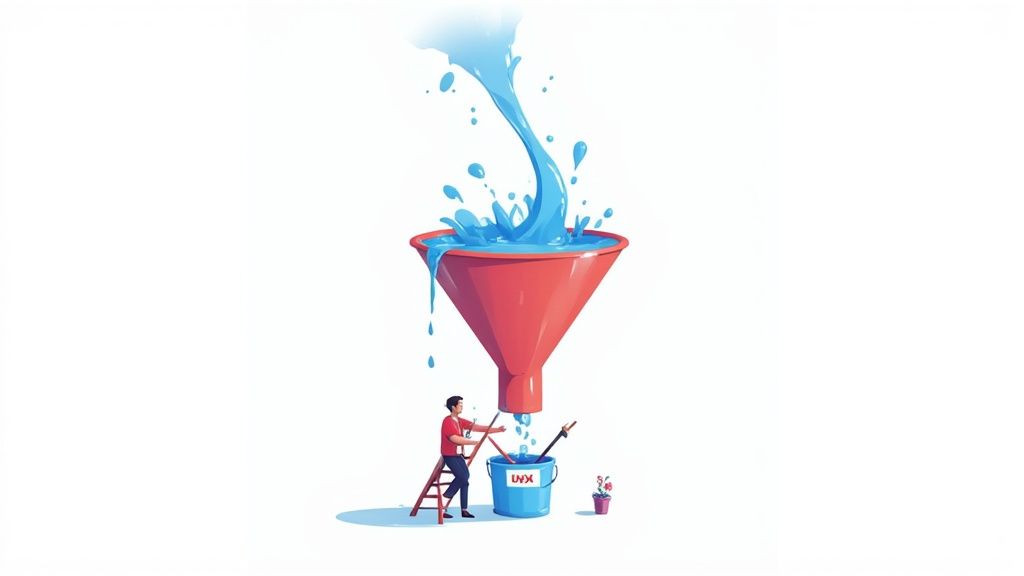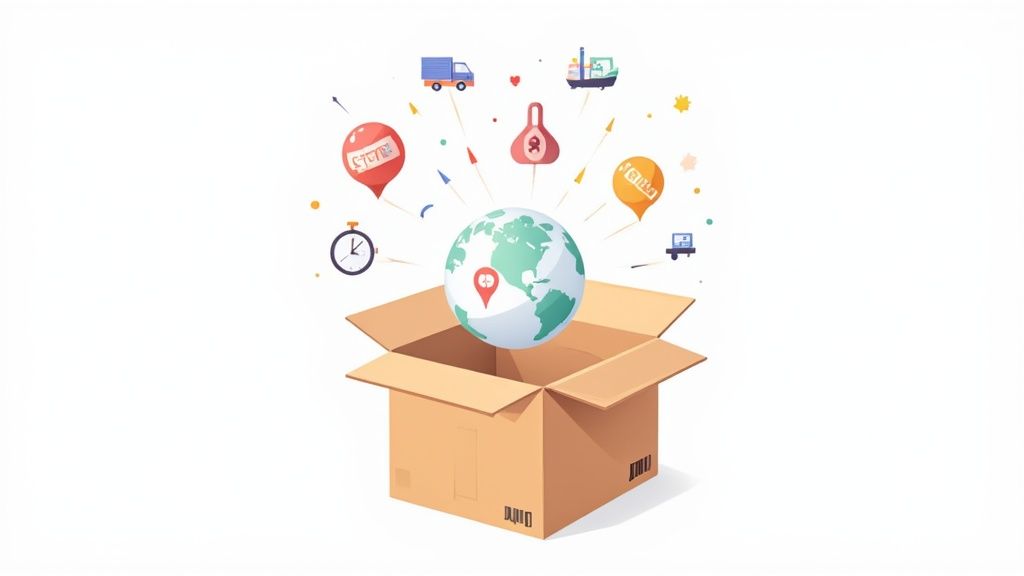
At its core, ecommerce consulting is a strategic partnership that brings specialized expertise to the table, all geared toward driving real growth in a fiercely competitive digital world. Think of it like hiring a seasoned coach for a talented athlete; you already have the potential, but a great consultant provides the game plan, sharpens your technique, and gives you the strategy to win.
Why Ecommerce Consulting Is No Longer a Luxury
The world of online retail is more crowded than ever. It's a hyper-competitive arena where millions of stores are all fighting for the same customer's attention, making it incredibly difficult to stand out from the noise. This intense competition is a direct result of just how easy it has become to launch an online store.
By 2025, it’s estimated there will be a staggering 28 million active e-commerce businesses worldwide. That's a 27% jump from pre-pandemic figures. This explosion is largely thanks to platforms like Shopify, Etsy, and Amazon FBA, which have dramatically lowered the barrier to entry. But here's the catch: with over 70% of these businesses making less than $1 million annually, just having a store online is far from a guarantee of success.
Moving Beyond Survival to Strategic Growth
This is where an ecommerce consulting partnership really shows its value. It’s not just a lifeline for struggling shops; it's a powerful growth accelerator for ambitious brands ready to scale. A consultant acts as an expert co-pilot, helping you navigate the endless complexities of online retail.
An effective consultant doesn't just offer abstract advice; they deliver a clear, actionable roadmap. They dig into your data, pinpoint hidden opportunities, and roll out strategies that turn casual browsers into loyal, repeat customers.
Their goal is to shift your business from a reactive state—constantly putting out fires—to a proactive one. They focus on building sustainable systems that deliver long-term, profitable growth. At its heart, ecommerce consulting is about guiding businesses through proven e-commerce growth strategies to meaningfully boost sales and market share.
Before we dive deeper, let's break down the main areas where a consultant can make a tangible difference. The table below outlines the core pillars of consulting and what kind of results you can realistically expect.
Each of these pillars addresses a critical piece of the puzzle. A great consultant doesn't just fix one area; they understand how they all work together to create a powerful, high-performing ecommerce machine.
The Role of an Expert Co-Pilot
A consultant’s job is to ask the tough questions and, more importantly, find the right answers. They bring an objective, outside perspective that you often can't get when you're deep in the day-to-day grind.
They'll tackle questions like:
- Why is your cart abandonment rate so high, and what specific steps can we take to fix it?
- Is your website’s user experience clunky and costing you sales?
- Are you actually targeting the right audience with your marketing budget?
- How can we get customers to come back and buy again, increasing their lifetime value?
By addressing these core challenges head-on, they help optimize every single facet of your operation. This expert guidance is designed to strengthen your business from the inside out, building a foundation for years to come.
To learn more about how this hands-on approach translates into specific actions, you can explore our detailed overview of ecommerce consulting services.
Core Services an Ecommerce Consultant Provides
Working with an ecommerce consultant goes way beyond just getting some high-level advice. It’s about getting tangible results through specific, targeted services. These are the real engines of growth, designed to find what’s broken, optimize what works, and open up entirely new ways to make money.
Think of your website as a physical retail store. The consultant is the expert who comes in to analyze foot traffic, redesign the floor plan to improve how people move through the space, and make sure every single customer interaction is smooth and guides them toward a purchase.
They don't just share opinions; they implement proven strategies backed by cold, hard data. This means they’ll do a deep dive into your analytics, customer behavior, and market position to pinpoint the most critical areas for improvement. The whole point is to make precise, impactful changes that create a positive ripple effect across your entire business.
The image below shows exactly how these focused services connect directly to a real, upward trend in sales growth—which is, after all, the main goal of bringing in a consultant.

As you can see, the core work a consultant does is directly linked to better financial outcomes, turning strategic insights into revenue you can actually measure.
Conversion Rate Optimization
Conversion Rate Optimization (CRO) is the art and science of getting more of your website visitors to take a specific action. That action could be making a purchase, signing up for a newsletter, or filling out a contact form. It’s one of the most valuable services a consultant offers because it’s all about maximizing the value of the traffic you already have.
Let's say you get 1,000 visitors, but only 10 buy something. Your conversion rate is 1%. If a consultant can bump that up to just 2%, you've literally doubled your revenue without spending a single extra cent on advertising. That’s the power of CRO.
Consultants use a few key tools and techniques to make this happen:
- A/B Testing: They’ll test different versions of a webpage element—like the color of a "Buy Now" button or the wording of a headline—to see which one performs better.
- Heatmap Analysis: This visually shows where users click, scroll, and spend the most time, revealing which parts of your site are grabbing attention and which are being completely ignored.
- User Session Recordings: Watching anonymized recordings of real people using your site helps identify specific points of friction, like a confusing checkout process or a broken link that’s costing you sales.
For instance, a consultant might see from heatmaps that no one is clicking your "Shipping Policy" link, a classic reason for cart abandonment. They could then test making this info more obvious on the product page, which could lead to a serious lift in completed orders.
User Experience and User Interface Design
If CRO is about fine-tuning specific actions, then User Experience (UX) and User Interface (UI) Design are about improving the customer's entire journey. UX is all about how a customer feels when using your site—is it easy, intuitive, and maybe even enjoyable? UI is about the visual design—is it clean, professional, and consistent with your brand?
A great user experience is simply non-negotiable today. If your navigation is clunky or the mobile layout is a mess, potential customers will bounce and go straight to your competitors. A consultant will audit your site’s entire flow, from the homepage all the way to the final "thank you" page, to make sure it’s absolutely seamless.
A consultant’s goal is to remove all friction. Every click should feel logical, every page should load quickly, and every piece of information should be easy to find. This builds trust and makes customers want to complete their purchase.
This process isn't just about making things look pretty. Strong UX/UI design has been shown to directly boost business metrics. For example, focusing on a more intuitive design can increase purchase rates by as much as 27%, simply because users feel more confident and guided through the buying process.
Strategic SEO and Content Planning
Finally, a top-tier ecommerce consultant makes sure your store is actually visible to the right people. Search Engine Optimization (SEO) is the practice of getting your site to rank higher on search engines like Google for the keywords that matter.
This is so much more than just stuffing keywords onto a page. A consultant builds a complete SEO strategy that covers all the bases:
- Technical SEO: Making sure your site is fast, mobile-friendly, and easy for search engines to crawl and understand.
- Keyword Research: Finding the high-intent search terms your target customers are actually typing in when they’re ready to buy products like yours.
- Content Strategy: Creating genuinely useful blog posts, buying guides, and product descriptions that answer customer questions and establish your brand as an authority in your niche.
A solid SEO strategy creates a sustainable pipeline of high-quality, "free" traffic. Unlike paid ads that disappear the moment you stop paying, a well-ranking product page can bring in customers for months, or even years. This long-term approach is absolutely fundamental to building a resilient and profitable online brand.
The Real ROI of Ecommerce Consulting
When you're running a business, every dollar counts. So, when you think about hiring an ecommerce consultant, it's natural to wonder, "Is this just another expense?" But that's the wrong way to look at it. The real value isn't just in the advice you get—it's in the cold, hard numbers that hit your bank account.
The goal is to connect every piece of strategic guidance directly to the metrics that actually matter: your revenue, your profit margins, and how much a customer is worth over their lifetime. This isn't just spending money; it's a direct investment in your store's financial health.
Let's imagine a store, we'll call it 'Artisan Goods Co.,' selling beautiful, handcrafted items. They had decent traffic and a great social media following, but their sales were stuck in neutral. The real killer? A massive 70% cart abandonment rate. People were loading up their carts, getting right to the finish line, and then just… leaving.
This is a classic case where a fresh pair of expert eyes can change everything. The owners were so deep in the day-to-day grind that they couldn't see the little bumps and friction points that were tripping up their customers.

Diagnosing the Problem and Implementing Solutions
An ecommerce consultant didn't just walk in with a bunch of opinions. They started with data. By digging into user session recordings and heatmaps, they quickly pinpointed what was going wrong during the Artisan Goods Co. checkout.
- Surprise Shipping Costs: The shipping fee was a last-minute surprise on the final payment page. This sticker shock was enough to send potential buyers running.
- Forced Account Creation: Nobody wants to fill out a lengthy form just to buy a single item. Forcing account creation was a major roadblock.
- Cluttered Checkout Page: The page was a mess of distracting banners and links, pulling focus away from the single most important action: completing the purchase.
With this data in hand, the consultant made a few simple but powerful changes. They added a shipping calculator right on the product pages, introduced a guest checkout option, and cleaned up the checkout flow to make it laser-focused. The impact was almost immediate.
By simply streamlining the path to purchase and removing those key friction points, a consultant can directly boost your bottom line. For a store like Artisan Goods Co., these small fixes led to a 25% drop in cart abandonment and a 15% lift in total sales in just three months.
This just goes to show that consulting isn't always about reinventing the wheel. Often, the biggest wins come from small, data-backed tweaks that yield huge financial returns.
Beyond a Single Sale: Customer Lifetime Value
But the real return on investment doesn't stop with that first sale. A smooth, trustworthy shopping experience does more than just get people to click "buy"—it builds loyalty.
Think about it: happy customers come back. For Artisan Goods Co., the revamped checkout process didn't just convert more shoppers; it created more repeat buyers. The consultant also helped them set up a simple post-purchase email sequence to keep the conversation going, turning one-time customers into genuine fans of the brand.
This is where consulting delivers exponential value. It’s not just about one transaction; it's about the entire customer journey, which strengthens your business from top to bottom.
- Higher Customer Lifetime Value (CLV): Repeat customers spend more over their lifetime, giving you a more stable and predictable revenue stream.
- Lower Customer Acquisition Costs (CAC): Keeping a customer is always cheaper than finding a new one.
- Improved Brand Reputation: A fantastic experience leads to glowing reviews and powerful word-of-mouth marketing.
In a market that’s growing like crazy—projected to hit USD 10.19 trillion in 2025—these efficiencies are what separate the winners from the rest. With 82% of shoppers buying online at least once a month, every single interaction counts. A frictionless experience is no longer a nice-to-have; it's essential.
Ultimately, the ROI of ecommerce consulting is about building a business that's more resilient, more profitable, and deeply customer-focused. To see how this all comes together, you can read our guide on how to improve ecommerce sales with a data-driven strategy.
How to Hire the Right Ecommerce Consultant
Finding the perfect ecommerce consulting partner isn't like hiring another employee. It’s more like choosing a strategic co-pilot for your business. The right choice can completely unlock your growth potential, while the wrong one is a fast track to wasted time, money, and momentum. This isn’t about checking boxes on a resume; it's about finding a true expert who gets your goals, your platform, and your company's DNA.
The first, most common mistake? Hiring a generalist for a specialist's job. An expert who works magic on a WooCommerce site might be totally out of their depth with a complex Shopify Plus setup. You need to find a consultant whose expertise directly mirrors your biggest headaches.
Define Your Needs and Goals
Before you even think about searching, you have to get crystal clear on what you're actually looking for. A vague goal like "I want to grow sales" is useless. You need to get specific. Are you trying to fix a leaky bucket, like a high cart abandonment rate? Or are you aiming to boost your customer lifetime value or gear up for an international launch?
Having sharp, well-defined objectives acts as your North Star through the whole hiring process.
- Pinpoint Your Core Problem: What's the single biggest thing holding your store back right now? Is it a technical glitch, a strategic blind spot, or a marketing fumble?
- Set Measurable Goals: Turn that problem into a goal with a number attached. For instance, "Reduce cart abandonment from 75% to 60% within six months."
- Know Your Platform Needs: Are you running on Shopify, BigCommerce, Magento, or something else? Your consultant absolutely must have deep, hands-on experience with your specific tech stack.
This clarity alone will let you instantly filter out candidates who aren't a good fit, saving you a ton of time.
Vet Candidates and Scrutinize Their Track Record
Once you've got a shortlist, the real work begins. This is where you look past the sales pitch and demand proof of performance. A great consultant will have a portfolio of success stories that are not only impressive but also directly relevant to your situation.
Start by asking for case studies. Don't just accept a glossy PDF—ask them to walk you through a project that looks a lot like your current challenge. A top-tier consultant, like the award-winning firm 2 Visions, can point to concrete, game-changing results like boosting a client's revenue by 71% or slashing customer acquisition costs by 31%.
When you're reviewing case studies, look beyond the flashy numbers. Ask how they did it. What was their process? What roadblocks did they hit and how did they navigate them? The story behind the stats is what really reveals their problem-solving chops.
Next, get a feel for their communication style and cultural fit. This person or team will become a close collaborator, so you have to be on the same wavelength. Do they listen more than they talk? Can they break down complex ideas into plain English? A consultant who can't clearly communicate their strategy will never get your team to buy in.
Ask the Right Questions
The interview is your moment to confirm they have the strategic depth you're paying for. Go beyond the surface-level stuff and really probe their thinking. Here’s a quick checklist of essential questions for any potential ecommerce consulting partner:
- "How do you define and measure success for a project like ours?" Their answer should immediately connect back to the specific KPIs you defined earlier.
- "Walk me through a past project where you hit a major, unexpected roadblock. How did you handle it?" This question uncovers their ability to adapt and solve problems when things go sideways.
- "What's your process for diagnosing problems and building a strategy?" You're listening for a methodical, data-driven approach, not just "gut feelings."
- "How do you handle communication and reporting?" You need to establish a clear rhythm for meetings and know exactly what kind of progress reports you'll get.
- "Based on what you know so far, what do you see as our single biggest opportunity?" This is a great test of their ability to think on their feet and offer immediate, insightful value.
Choosing the right consultant is a foundational business decision. If you follow this structured approach, you're not just hiring a skilled expert—you're finding a true partner who is perfectly positioned to help you scale.
Breaking Down Ecommerce Consulting Costs

Let's talk about money. Understanding the financial side of ecommerce consulting can feel like a black box, but it’s actually pretty straightforward once you break it down. Think of it like hiring a contractor for a home renovation. You wouldn't pay the same way for a quick plumbing fix as you would for a full kitchen remodel.
The trick is to align the pricing with the job. Are you putting out a fire, like a sudden drop in conversions? Or are you planning a major website overhaul? Maybe you just need a long-term strategic partner to keep you growing. Each of these scenarios has a pricing model that makes the most sense. Let’s look at the three most common ways consultants structure their fees.
Hourly Rates
The hourly model is exactly what it sounds like: a "pay-as-you-go" plan. You're billed for every hour the consultant spends working on your business. This is your best bet for very specific, short-term tasks or when you're not quite sure what the full scope of a problem is yet.
For instance, you might hire a consultant by the hour to:
- Diagnose why your conversion rates suddenly tanked.
- Fix a nasty technical SEO issue that's killing your search rankings.
- Provide a few hours of high-level coaching for your in-house team.
The big win here is flexibility. You only pay for the time you use, which is perfect for smaller budgets or one-off problems. The downside? Cost uncertainty. If the project scope creeps or the problem is bigger than you thought, those hours can stack up fast, making it a risky choice for larger, more complex projects.
Project-Based Fees
With a project-based fee, you agree on a single, flat rate for a project with a clear beginning and end. This is like getting that kitchen remodel quote—you know the total cost upfront for a specific set of deliverables. It's the perfect model when you know exactly what you want the outcome to be.
A project-based fee gives you predictability. You and the consultant are on the same page about what gets done and for how much, which eliminates surprise bills and makes sure everyone’s expectations are aligned from the start.
This structure is ideal for initiatives like:
- A full website redesign and launch.
- Building out and implementing a comprehensive CRO strategy.
- A deep-dive UX audit that ends with a clear, actionable report.
The main advantage is knowing your exact investment, which makes budgeting a breeze. The potential catch is that it's less flexible. If you decide to change direction or add to the project mid-way, you'll likely need to renegotiate the scope and cost.
Monthly Retainers
Think of a monthly retainer as putting an expert on your team. You pay a fixed fee each month for ongoing access to their brain and skills. This is the "strategic partnership" model, like having a master builder on speed dial for continuous improvements and long-range planning. It’s the go-to for businesses focused on sustained, long-term growth.
A retainer means you get an expert who becomes intimately familiar with your business, your market, and your goals. This relationship is all about proactive strategy, not just reactive fixes. It’s perfect for ongoing needs like SEO management, continuous A/B testing, and forward-thinking strategic guidance. While it’s a bigger commitment, the real ROI comes from building consistent, powerful momentum over time.
Future-Proofing Your Store with New Technology
A great ecommerce consultant does more than just plug the leaks in your current setup; they build a bridge to what's coming next. Their real value often lies in getting your business ready for tomorrow, helping you integrate emerging tech to build a store that can adapt and thrive. It's about moving from reacting to market shifts to proactively shaping your own future.
The speed of change in this space is no joke. Global online sales are on track to hit a massive $8.3 trillion in 2025—that's a jump of over 55% in just four years. With mobile phones driving more than 70% of these sales and digital wallets handling over half of all payments, you need more than just a basic storefront to keep up. This isn't about chasing shiny objects; it’s about making smart, strategic investments in technology that actually pay off.
Harnessing AI for Practical Growth
Artificial Intelligence (AI) has officially graduated from a buzzword to a real-world tool for growing your business. A consultant can show you how to put AI to work in ways that directly boost your bottom line, without needing a dedicated team of data scientists. The goal here is to use AI to make better, faster decisions.
Here are a few high-impact ways to do it:
- Personalized Product Recommendations: Forget those generic "you might also like" carousels. AI algorithms can analyze a user's real-time browsing, past purchases, and on-site behavior to serve up hyper-relevant suggestions. This is a proven way to lift cross-sells and increase your average order value.
- Predictive Inventory Management: Stocking out of a best-seller is lost revenue, and overstocking a slow-mover ties up cash. AI can chew through historical sales data, market trends, and even seasonality to forecast demand with incredible accuracy, making sure you have the right products on hand at the right time.
- Enhanced Customer Service: Modern AI-powered chatbots and digital avatars are surprisingly good at handling common customer questions around the clock. This frees up your human support team to tackle the more complex, high-touch issues while ensuring your customers get instant answers—a critical piece of building trust.
Embracing Headless Commerce and System Integration
Another frontier where an ecommerce consulting expert is invaluable is navigating advanced setups like headless commerce. The easiest way to think about it is separating your beautiful, customer-facing "storefront" from the back-end "warehouse" that runs everything—products, orders, customer data, and all that good stuff.
This separation gives you incredible flexibility. Want to launch a new mobile app, a "try-on" experience with a smart mirror, or a voice-activated shopping feature? With a headless architecture, you can do it without having to rebuild your entire back-end system from scratch. It’s the ultimate foundation for an agile, future-ready brand.
To truly future-proof your ecommerce store, leveraging new technology is crucial. A key part of this is exploring the top API integration platforms to streamline workflows and ensure seamless connectivity between your various business tools. This creates a cohesive tech stack that works together, not against itself.
The Focus on Sustainability
Finally, it's impossible to talk about the future without talking about sustainability. Today’s consumers care deeply about a brand's environmental and social footprint. It’s no longer a niche concern; for many, it's a primary reason to choose one brand over another. A forward-looking consultant can help you weave sustainable practices into both your operations and your marketing.
This might look like:
- Optimizing shipping routes to lower your carbon footprint.
- Switching to eco-friendly packaging materials.
- Clearly highlighting your commitment to ethical sourcing right on your product pages.
By getting ahead of these technologies and trends, you aren’t just keeping up with the competition. You’re building a smarter, more flexible, and more responsible business that’s set up to succeed for years to come.
Frequently Asked Questions About Ecommerce Consulting
It's natural to have questions when you're thinking about bringing in an expert. This is a big decision for your brand. To help clear things up, I’ve put together answers to the most common questions we hear from store owners just like you.
When Is the Right Time to Hire an Ecommerce Consultant?
From my experience, store owners usually reach out at two critical moments. The first is when growth has hit a wall, and you're not sure why your hard work isn't paying off anymore. The second is the exact opposite: you're growing so fast that your systems are starting to creak and groan under the pressure, and you need a solid plan to scale without everything falling apart.
An ecommerce consulting pro can step in to either find what's holding you back or build the framework you need for that next big leap in growth.
What Is the Difference Between a Consultant and an Agency?
This is a great question. Think of it like building a custom home. A consultant is your architect. They’re the one who listens to your vision, analyzes the landscape, and draws up the detailed blueprints for success—the high-level strategy and diagnostics.
An agency, on the other hand, is the team of builders. They take those blueprints and handle the day-to-day construction, from laying the foundation to painting the walls. A consultant gives you the "what" and "why," while an agency or your internal team handles the "how." Many of the best projects involve a consultant working hand-in-glove with an agency to make sure the strategy is brought to life perfectly.
How Long Does a Typical Consulting Engagement Last?
The timeline really depends on what you’re trying to achieve. There’s no one-size-fits-all answer.
- Short-Term Projects: If you have a very specific goal, like a complete website audit or a detailed conversion rate optimization plan, you might be looking at a 4-8 week engagement.
- Long-Term Retainers: For brands that want ongoing strategic guidance to continuously optimize and grow, a retainer partnership often lasts from 6 months to a year, and sometimes much longer.
Ultimately, the scope dictates the timeline. A quick fix requires a different commitment than a long-term strategic overhaul aimed at fundamentally transforming your business operations and market position.
What Should I Have Prepared for a First Meeting?
To get the absolute most out of our first chat, a little prep goes a long way. Try to come with your main business goals clearly defined. For example, knowing you want to "increase conversion rate by 20% in Q3" is incredibly helpful.
It's also super useful if you can provide access to your key analytics, like Google Analytics and your Shopify reports. Finally, having a rough idea of your budget and a list of the biggest pain points you think your store is facing will help a consultant give you real, valuable insights right from the get-go.
Ready to see how expert guidance can transform your Shopify store? The team of dedicated specialists at ECORN is here to help you design, develop, and optimize for growth. Get started with a project today.






